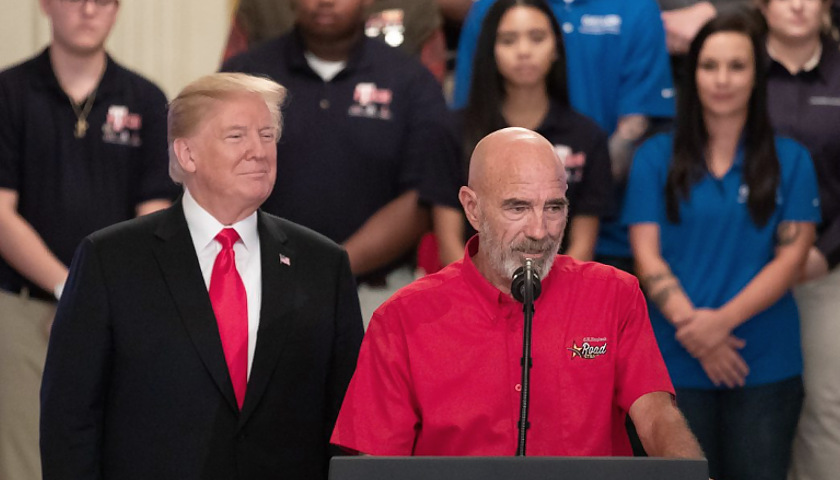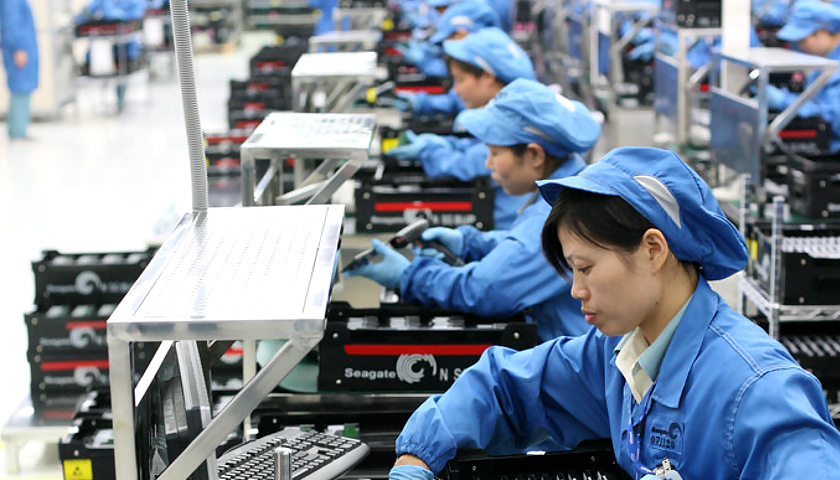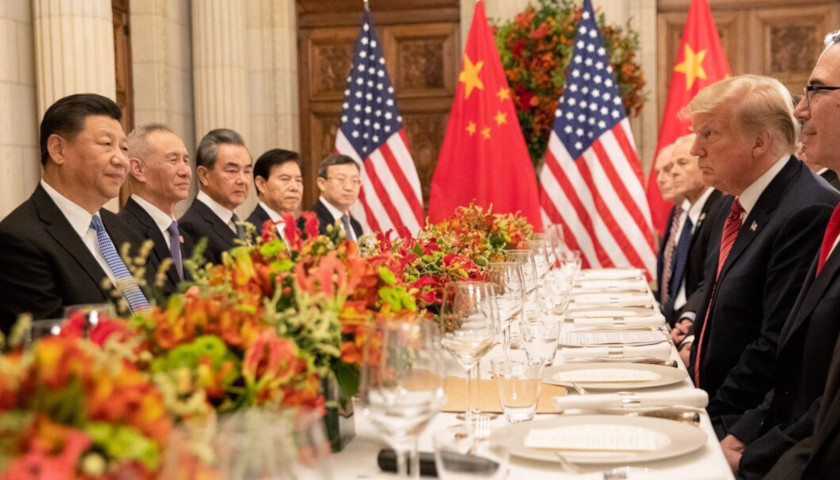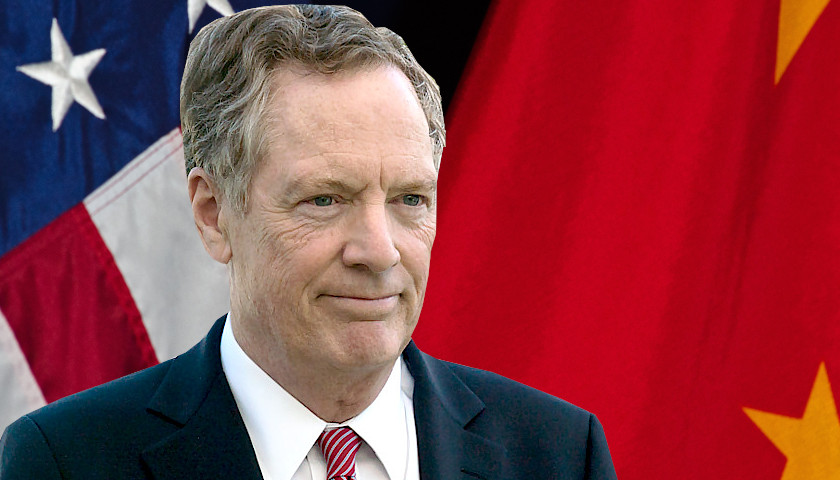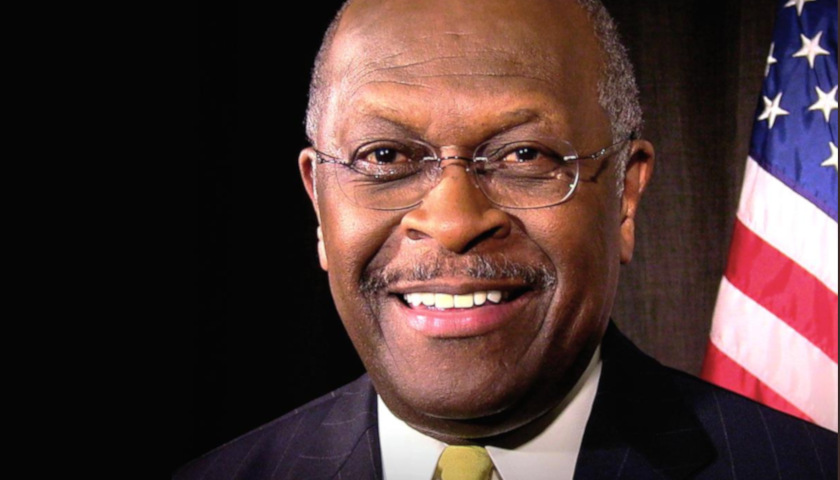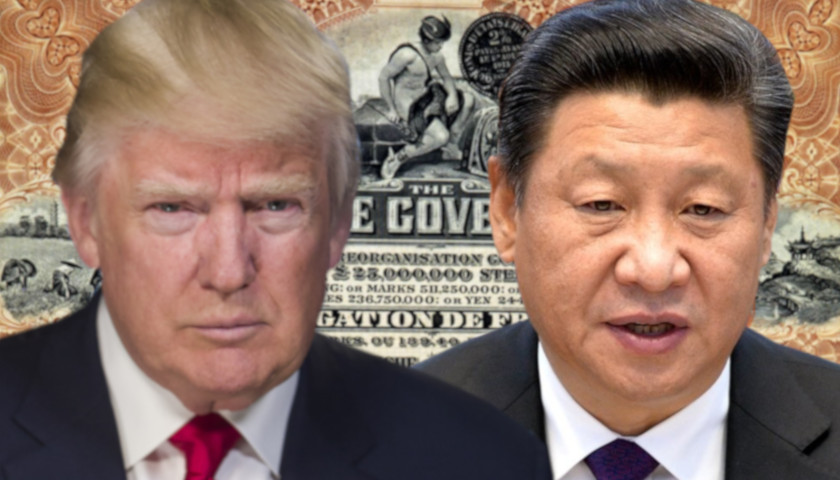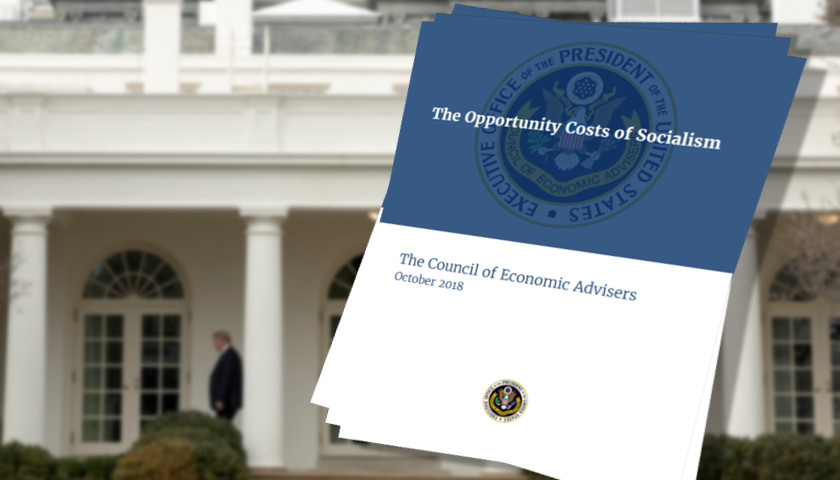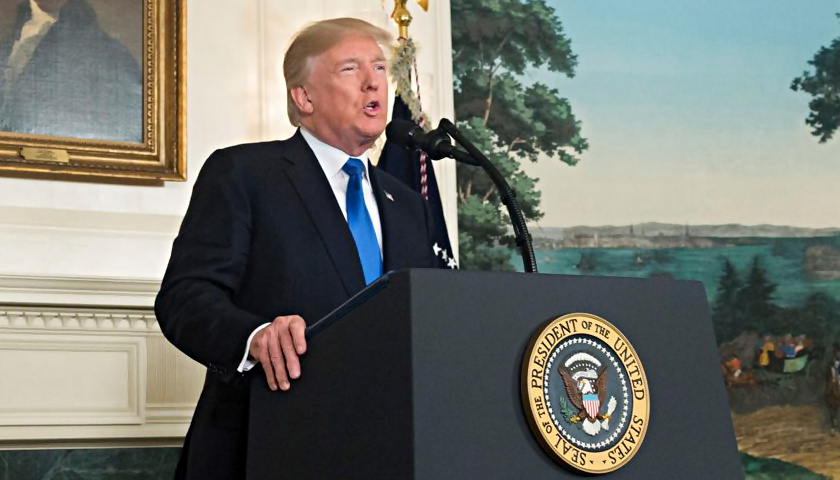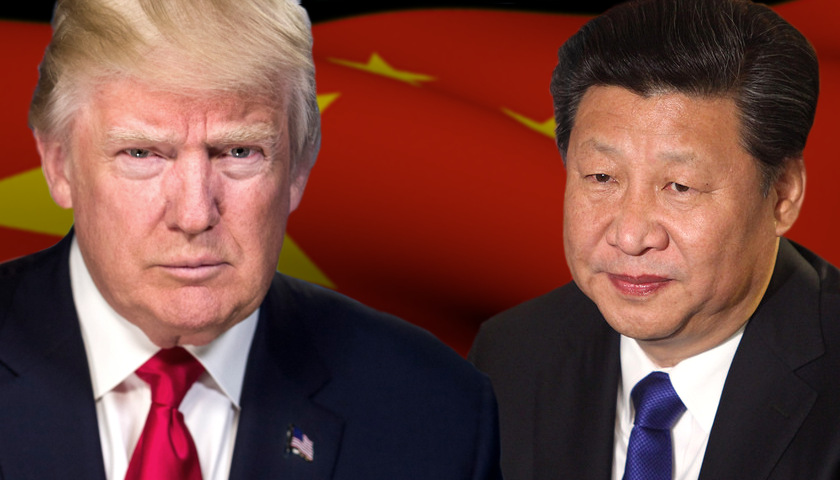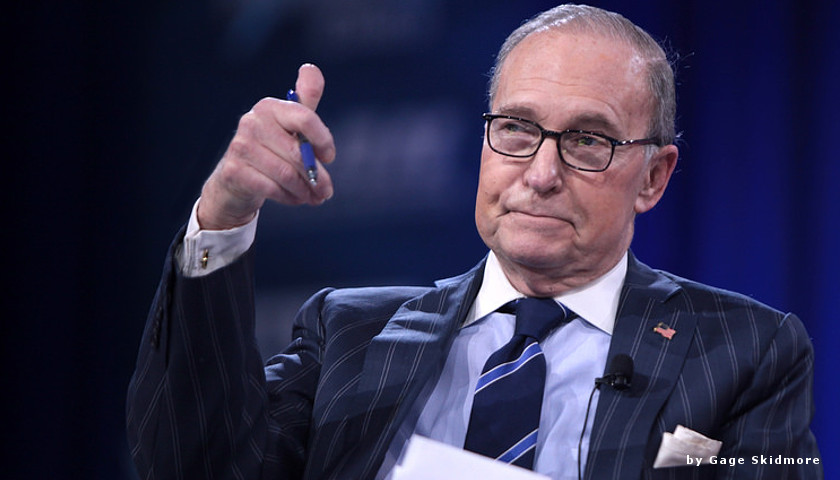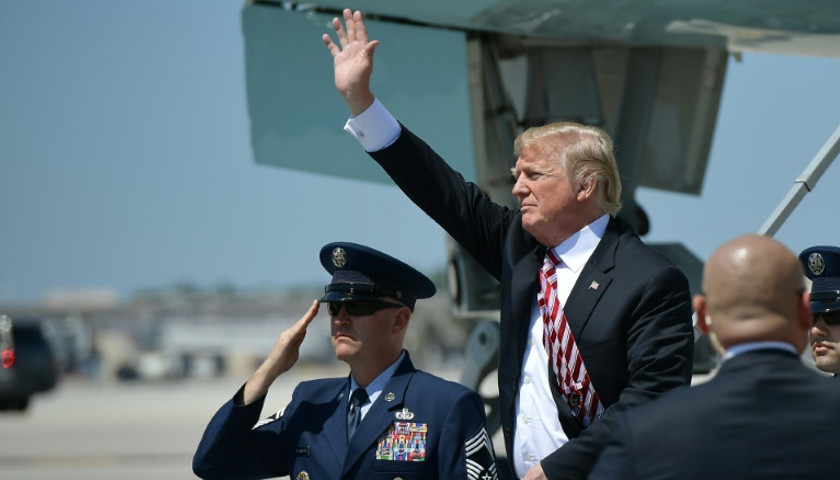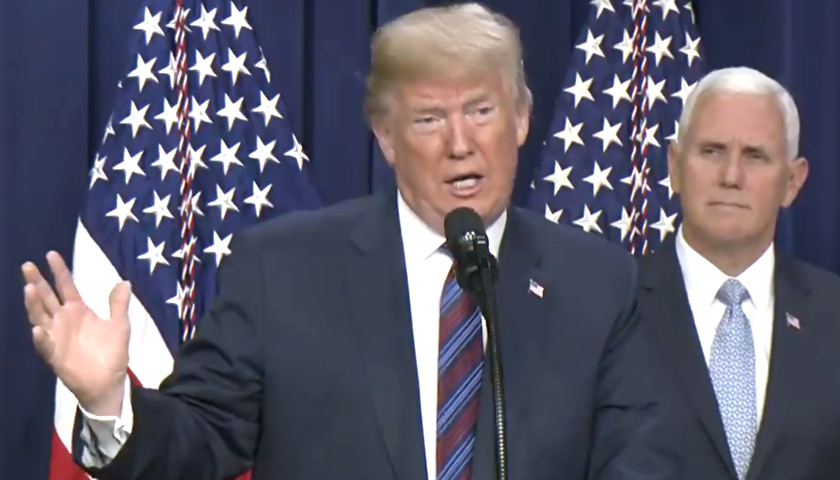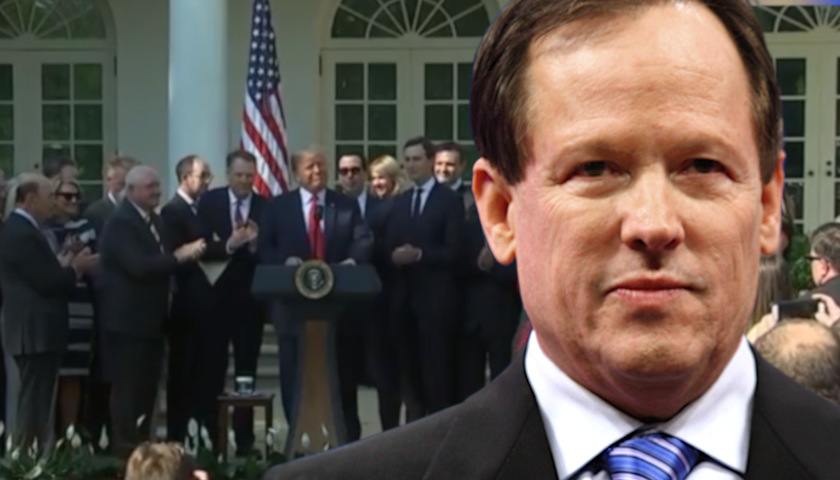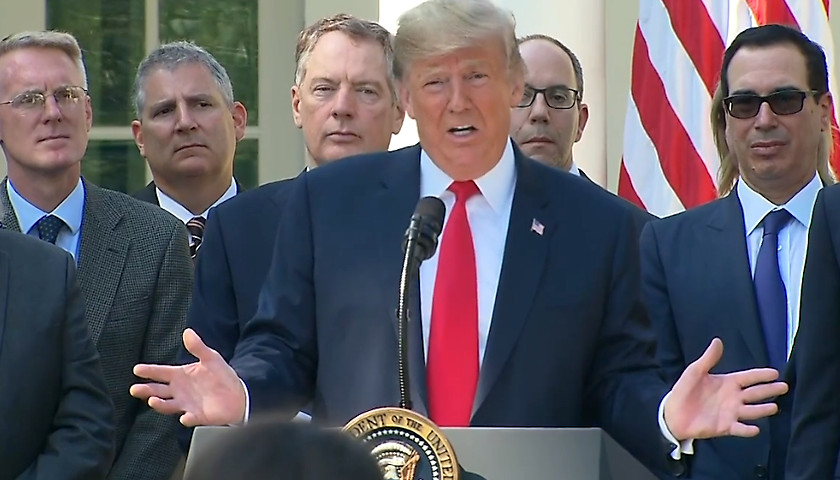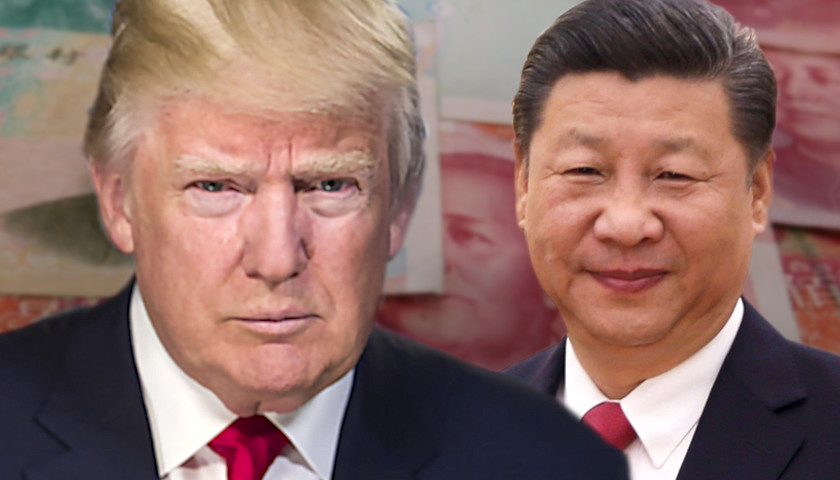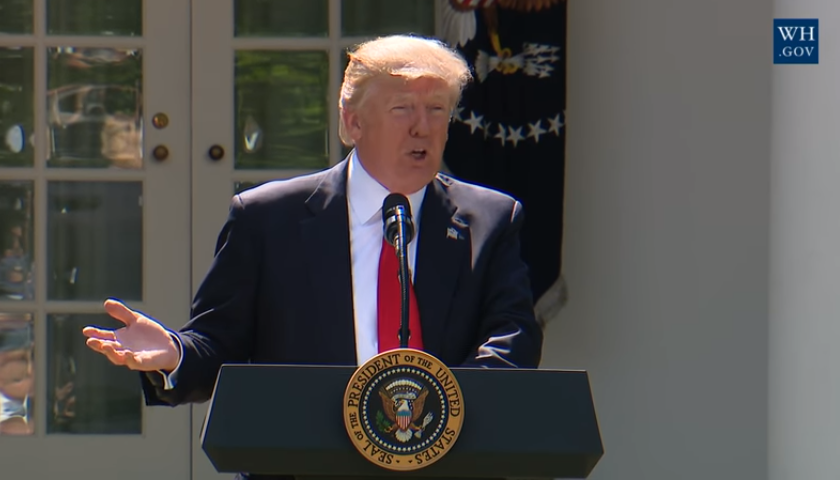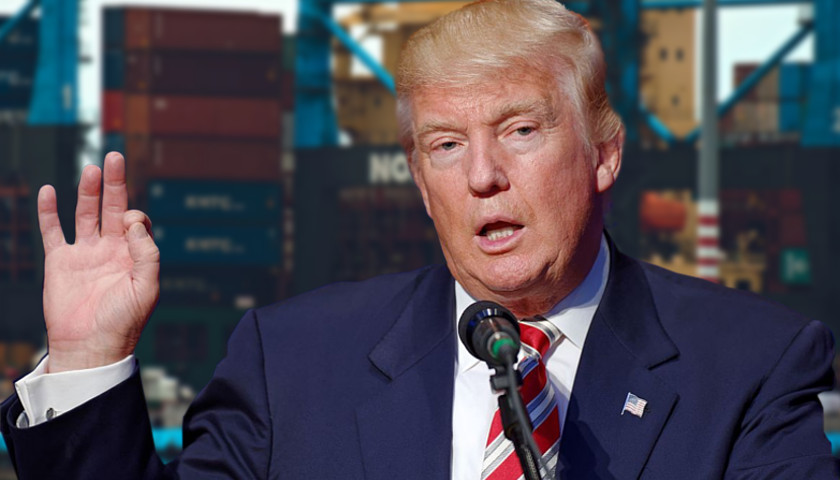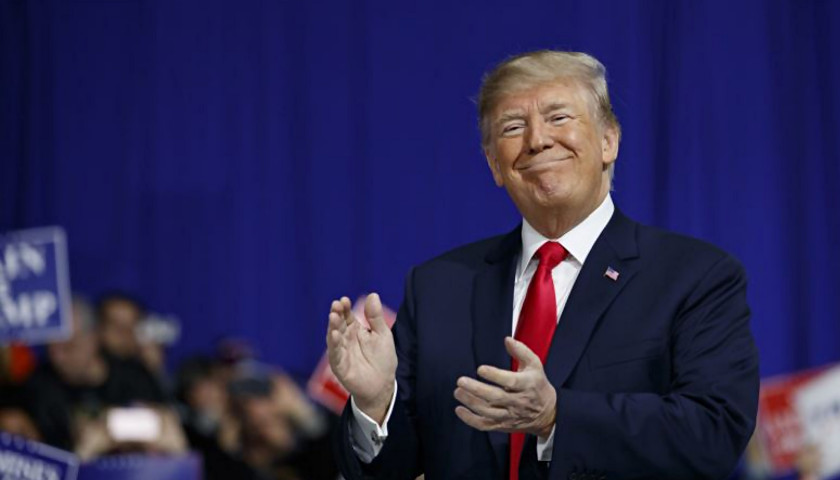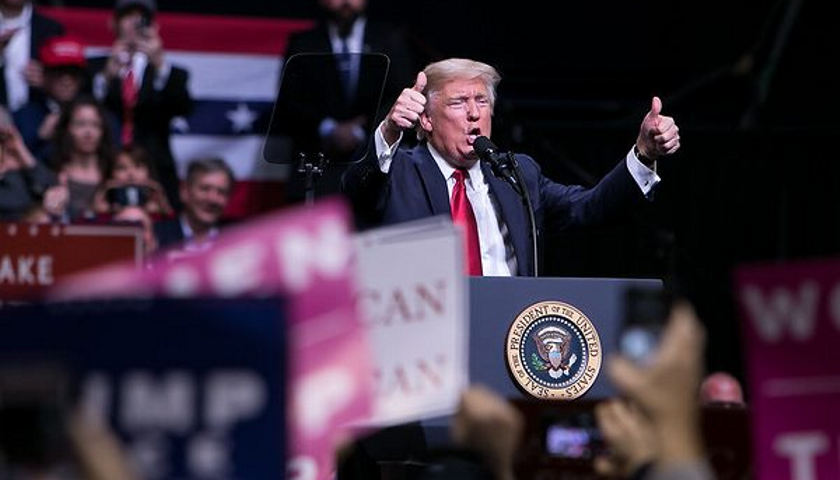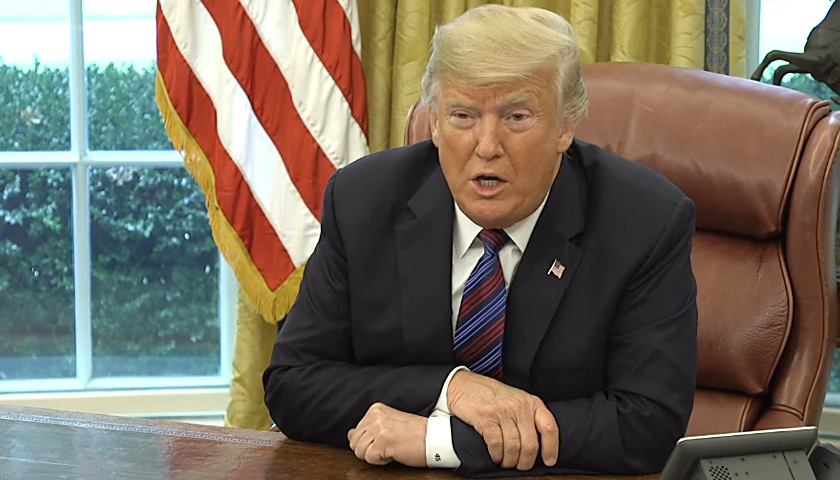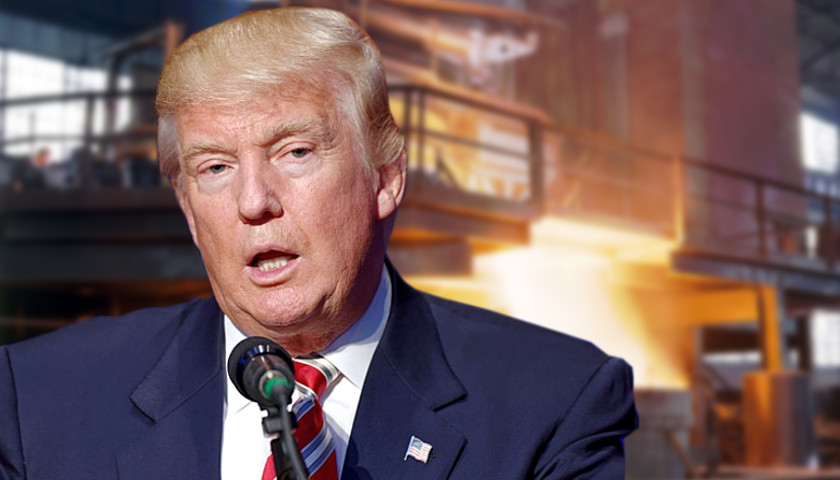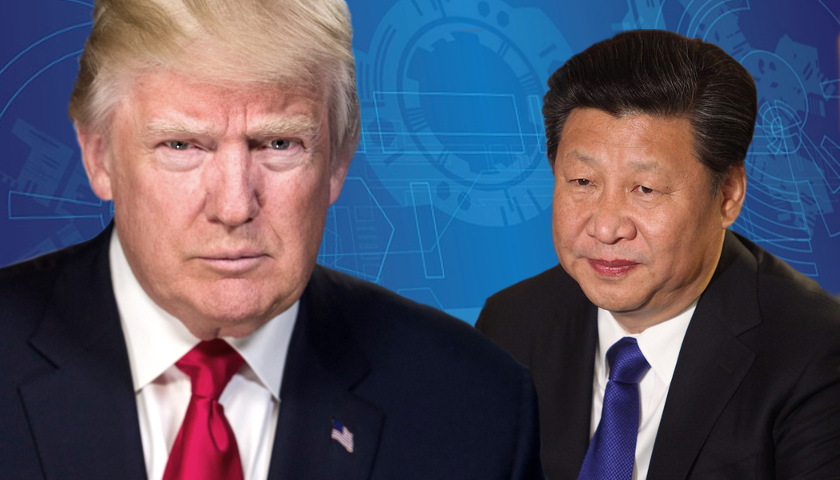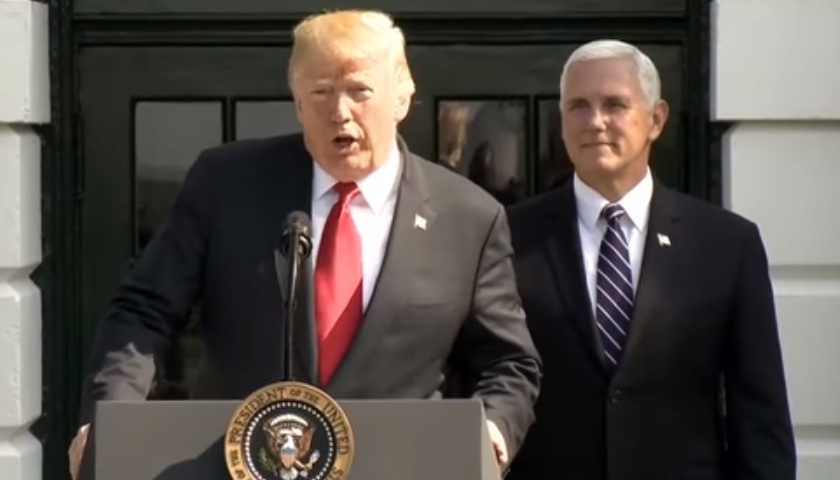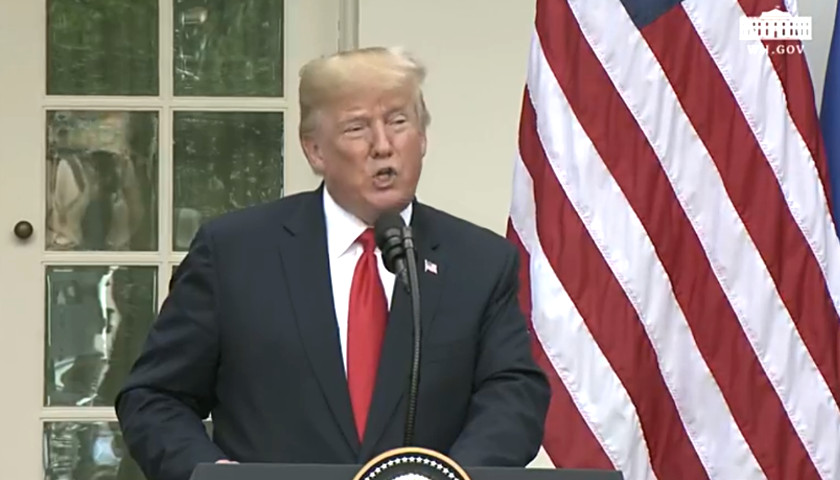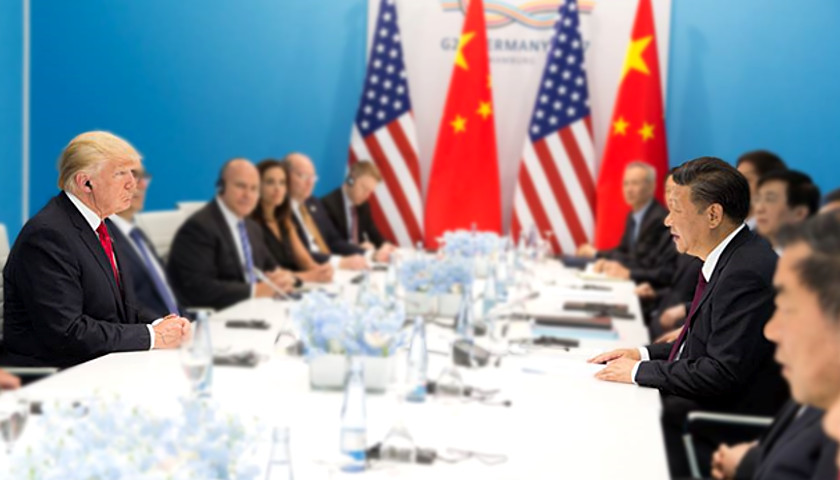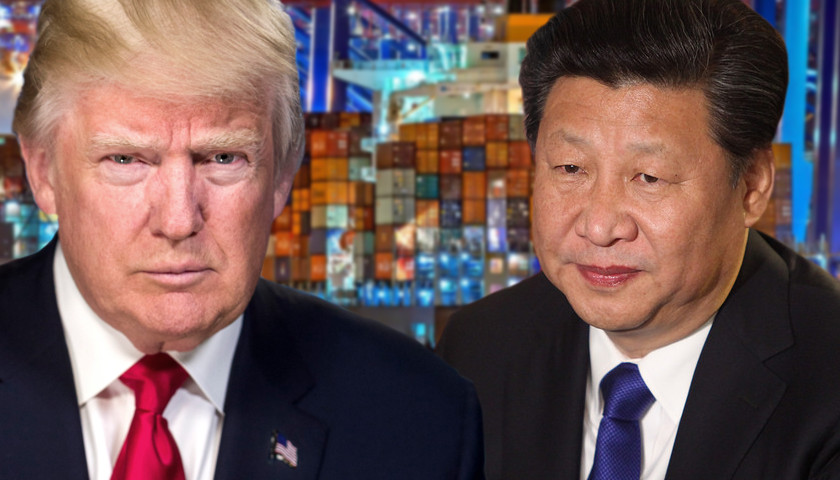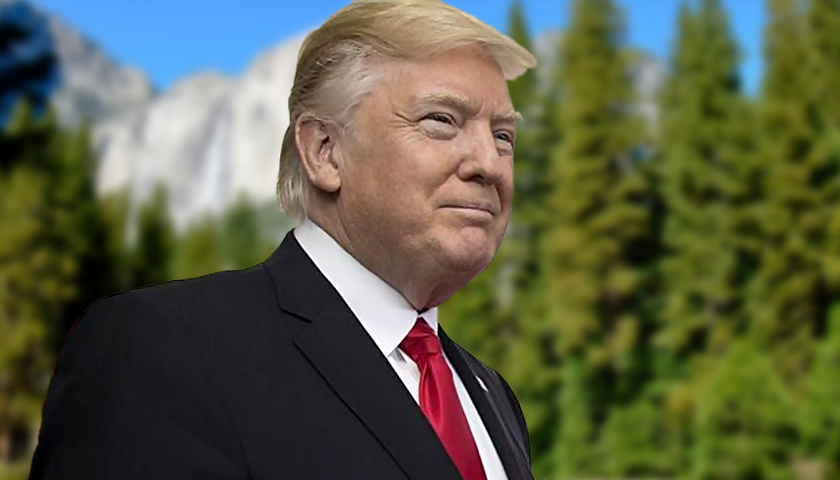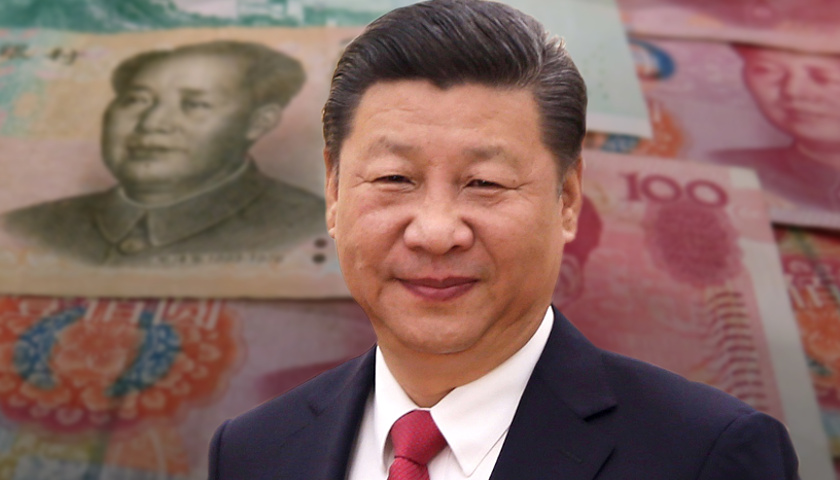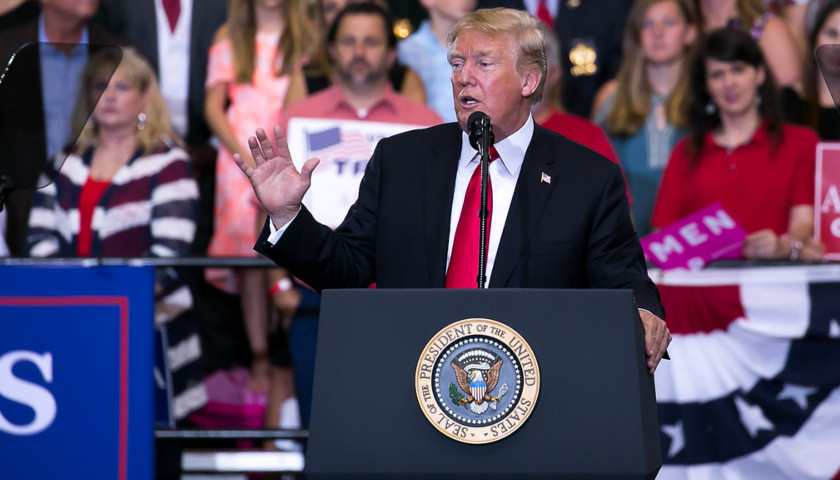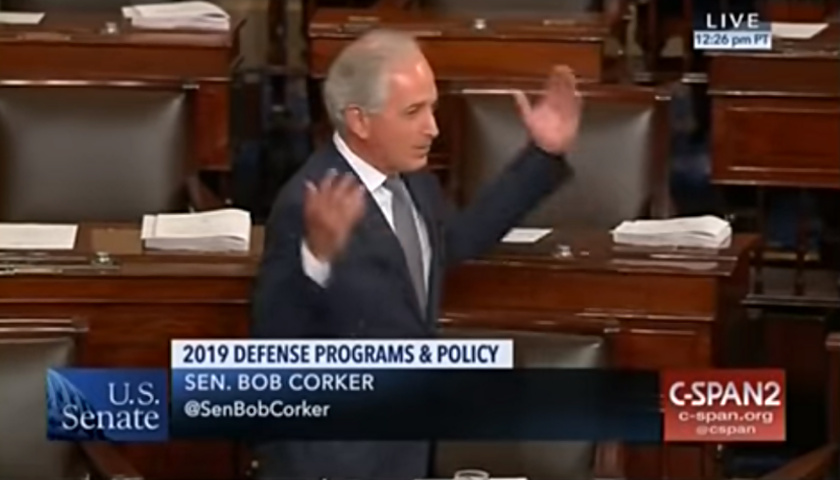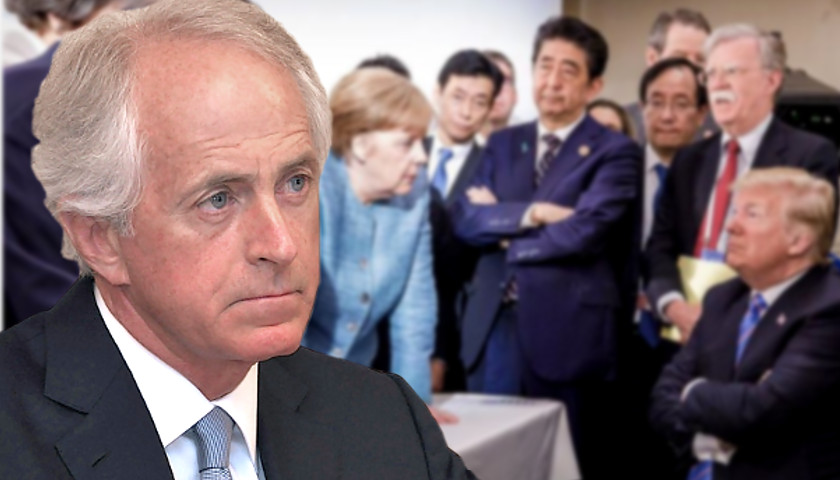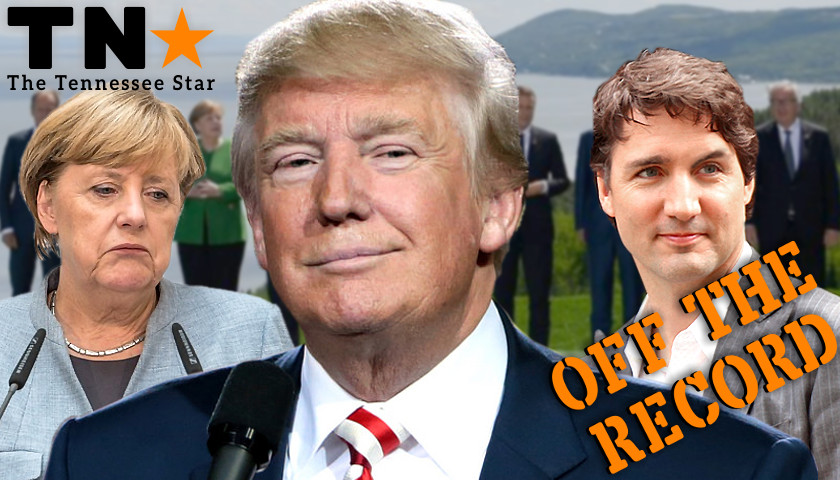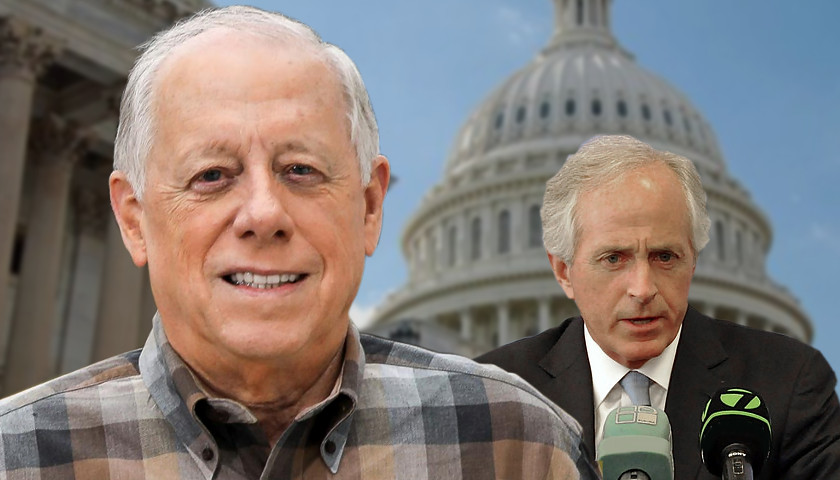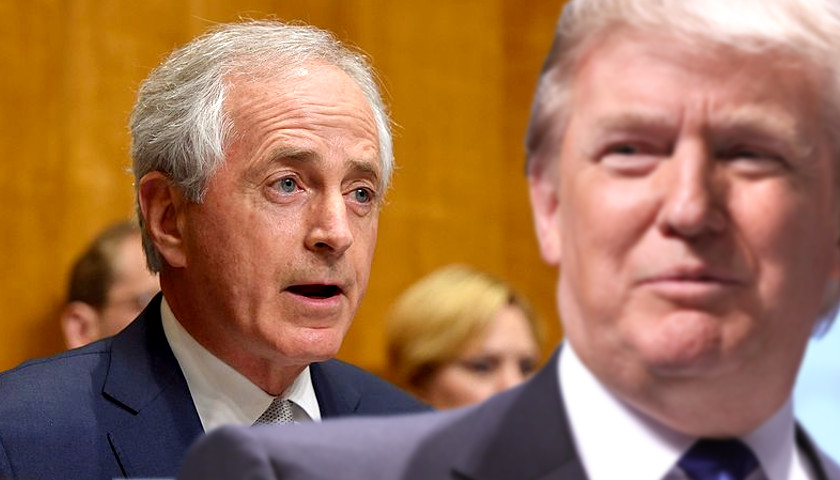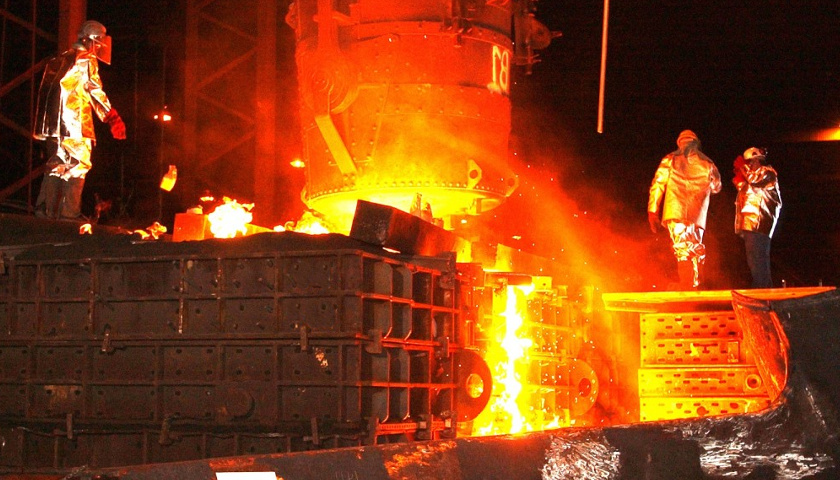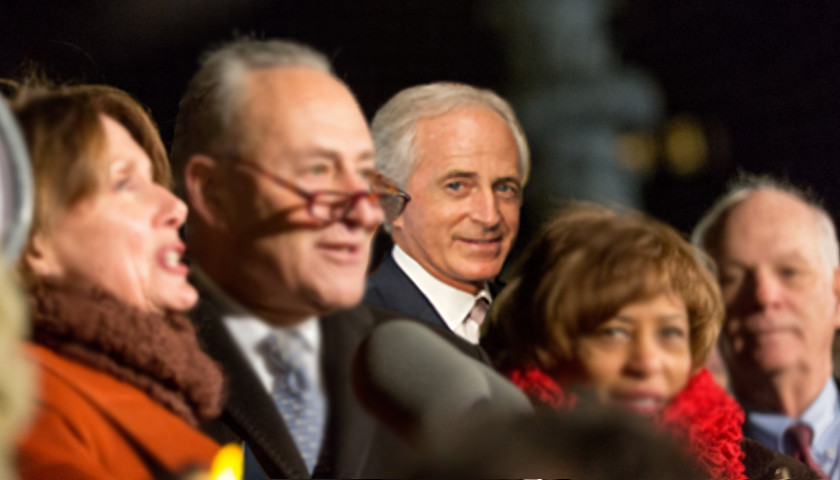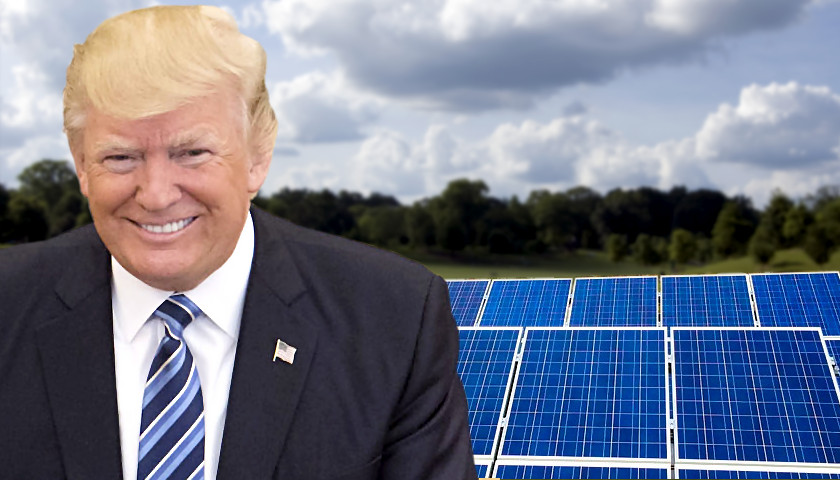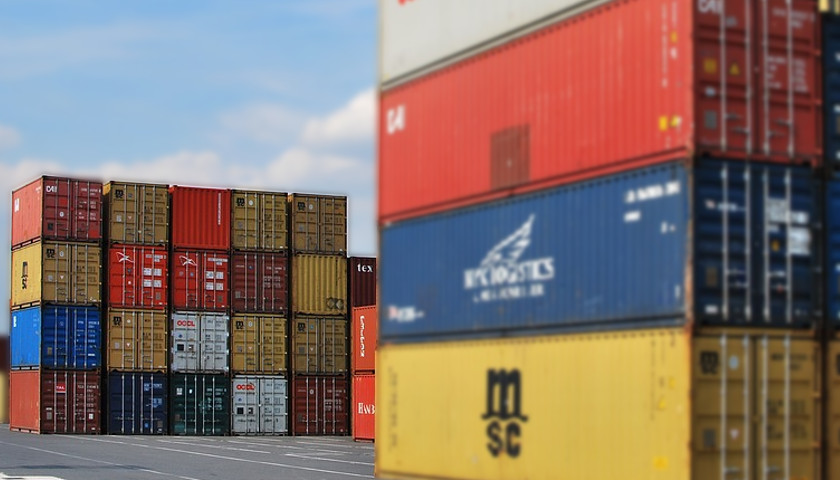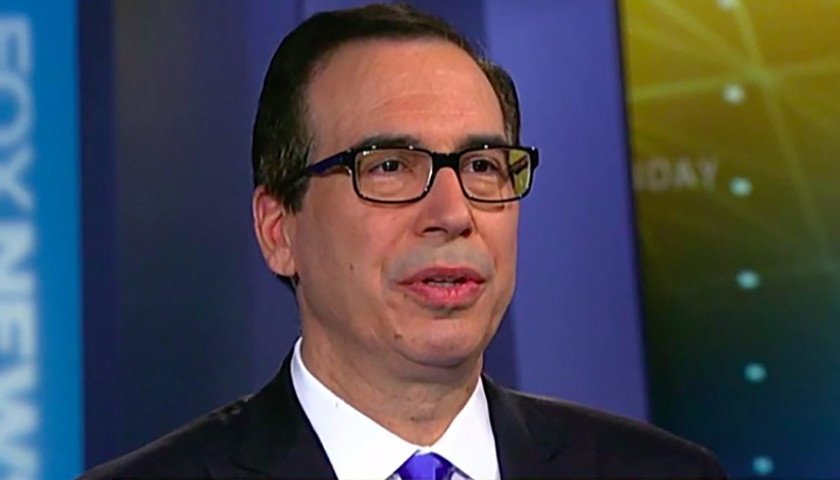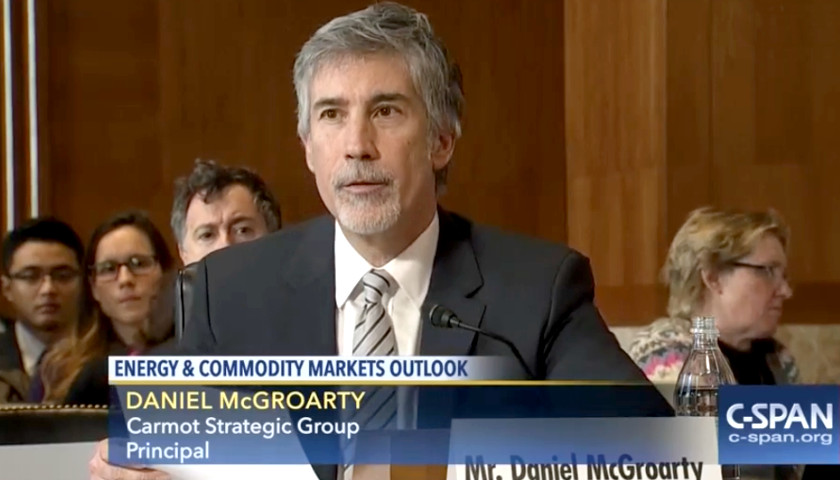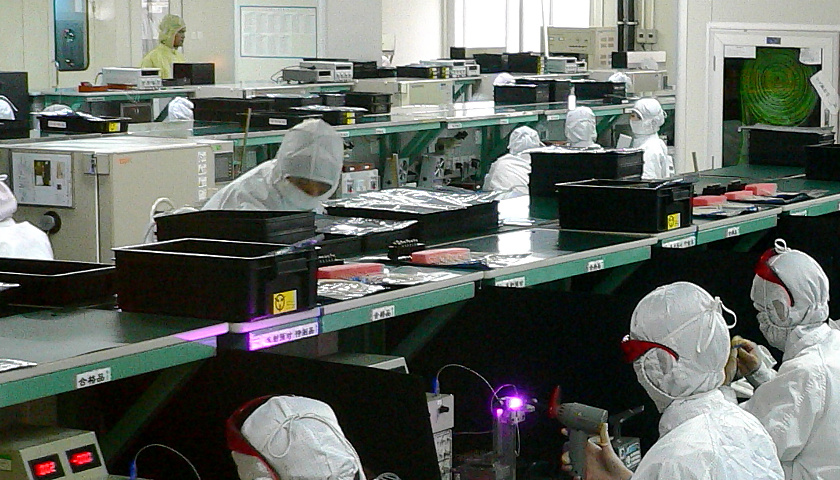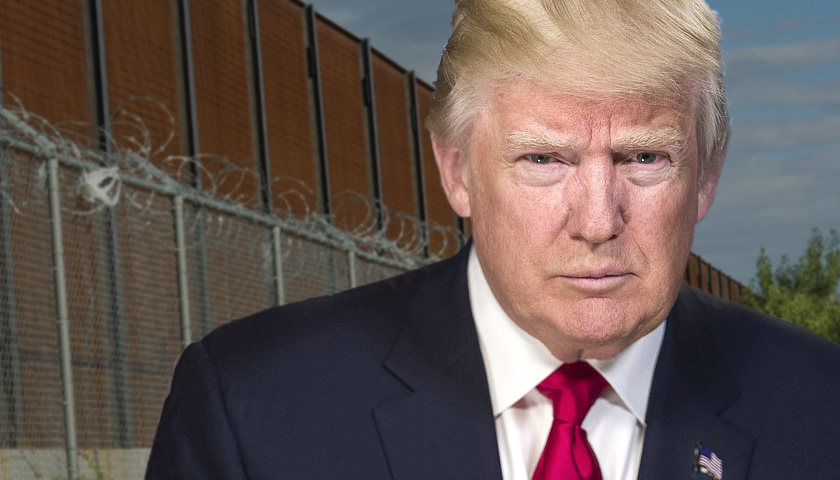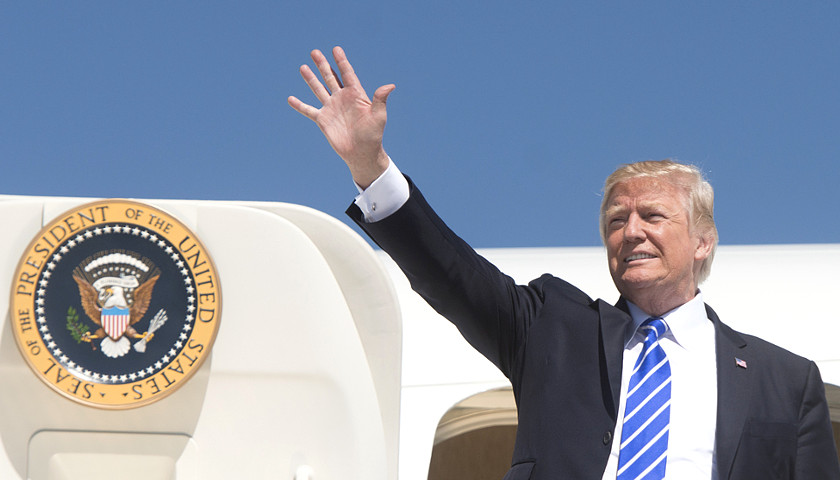by Tim Pearce American farmers are sticking behind President Donald Trump despite a trade agenda that makes selling produce to foreign countries more difficult and less profitable, Bloomberg reported. The United States’s ongoing trade war with China is a primary concern for U.S. farmers that sell crops, especially soybeans, overseas. While Trump’s view on and use of tariffs are not popular in the agriculture community, many of his other policies are. “We send [China] a lot of soybeans,” Aron Carlson, who farms corn and soy in Indiana, told Bloomberg. “They’re basically buying every other bushel in the world and we’re the last invited to the table, and I don’t like to be last. I want to be front and center, as far as that stuff goes.” “I hope he can get the whole trade thing with China figured out. I think we need to quit picking some fights,” Carlson said. Carlson voted for Trump and is still backing the president, though his support is “softening.” In the ongoing fight over the partial government shutdown and funding for a border wall with Mexico, Carlson agrees with Trump that there are “serious problems going on with that border.” Also, farmers are willing to take short-term financial hits…
Read the full storyTag: trade
China Factory Activity Shrinks for First Time in Two Years
China’s factory activity shrank in December for the first time in more than two years, an official survey showed Monday, intensifying pressure on Beijing to reverse an economic slowdown as it enters trade talks with the Trump administration. The purchasing managers’ index of the National Bureau of Statistics and an industry group, the China Federation of Logistics & Purchasing, fell to 49.4 from November’s 50.0 on a 100-point scale. Any reading below 50 shows that activity is contracting. The December figure was the lowest since February 2016 and the first drop since July 2016. In the quarter that ended in September, China’s economic growth sank to a post-global crisis low of 6.5 percent compared with a year earlier. The slowdown occurred despite government efforts to stem the downturn by ordering banks to lend more and by boosting spending on public works construction. Forecasters expect annual growth of about 6.5 percent, down slightly from 2017’s 6.7 percent. But some industry segments, including auto and real estate sales, have suffered more serious declines. “Downward pressure on the economy is still large,” economist Zhang Liqun said in a statement issued with the PMI. Overall orders and exports both contracted, indicating that Chinese factories…
Read the full storyCommentary: The Arrest of Huawei Executive Meng Wanzhou Helps Negotiations with China
by Steven W. Mosher Wall Street is worried that the arrest of Huawei Vice Chairman Meng Wanzhou will put President Trump’s ongoing trade negotiations with China on ice. They fear that China may retreat from its G-20 promises, or perhaps even call off the negotiations altogether. Some have suggested that U.S. tech executives avoid traveling to China, fearing revenge arrests. As someone who has followed elite politics in Communist China for 40 years, I disagree. In fact, I think that Meng’s arrest may actually help move the negotiations along. China’s leaders see her arrest as a deliberate provocation, intended to provoke them into the kinds of overreactions that would blow up the trade negotiations. They view it, in other words, as a strategic deception. Anyone who has read their Sun-Tzu knows that deception is the primary category—the default position, if you will—of Chinese strategic thought. And the ancient strategist’s famous dictum, “All warfare is deception,” obviously applies to trade wars as well. China knows that the president’s advisors are divided between the globalists, who hope for a win-win agreement on trade, and the nationalists, who want to disengage America’s economy from China’s. They fear that the nationalists have arranged…
Read the full storyBob Lighthizer Compared to ‘General Patton’ in Leading the Way on Trade Talks with China
by Natalia Castro While some have been critical of President Donald Trump’s use of tariffs to win the trade war with China, one analyst is arguing these tariffs have been one of many tools used by the Trump administration to push China to comply with fairer trade deals. Last week on the Conservative Commandos Radio Show Senior Policy Advisor at America First Policies Curtis Ellis joined Natalia Castro to discuss the U.S. trade relationship with China. Ellis noted how China has cheated the U.S. and the entire world out of billions by abusing trade laws to their benefit. For the first time in nearly 30 years, the Trump Administration is forcing China to the negotiating table and presenting an opportunity for real change. Ellis argued, in the long run, the Trump trade agenda will boost U.S. productivity and save our technology from Chinese theft. While China has come close to deals before only to back out and continue cheating, Ellis notes that this situation is different for one key reason: Bob Lighthizer. Ellis explained, “Leading out team of negotiators is Bob Lighthizer, he is the U.S. Trade Representative. This is General Patton in the trade world. He is seasoned.…
Read the full storyHerman Cain Commentary: Five Things We Can Be Thankful For in the Trump Era
by Herman Cain It’s the season of gratitude and time to take measure of the great ways we can appreciate all that we have as Americans. Here are five things that Donald Trump has done for our country, for which we can all be grateful as one nation. Historic Prosperity GDP data strongly indicate that the American economy is on pace to grow by more than 3 percent in 2018 — maybe even 3.5 percent. Democrats like Barack Obama said it couldn’t be done — that sluggish growth of 2 percent or less was the “new normal” and we should just get used to it. I, for one, am thankful President Trump proved that those pessimistic projections were utter nonsense. In just 22 months, President Trump has delivered historic levels of job creation. Unemployment is at an all-time low for Black and Hispanic Americans. Consumer confidence is at an 18-year high. Wages are growing for ordinary Americans. Small business confidence is at a 45-year high. American manufacturing operations are hiring once again. There’s something for everyone to be thankful for in this economy. Avoided Foreign Wars Compared to his predecessors, fewer U.S. servicemen and women have been deployed overseas thanks to President Trump’s judicious use of the American military. This is not…
Read the full storySteve Gill Commentary: Is a Tennessee Foundation a Key to Resolving Debt and Trade Issues with China?
by Steve Gill The ongoing trade dispute between the U.S. and China has occupied much of the business media’s focus in recent months. But an “old” debt battle between the two countries that has escaped notice by most political and business leaders in both countries has recently drawn the attention of President Donald Trump — and his top economic advisors. At the centerpiece of this issue is a little known Foundation based in Lewisburg, Tennessee that represents the holders of the debts owed by China. One of the cards held by China in the trade war is their nearly $1.2 trillion in U.S Treasury bonds that, if sold suddenly and at a discount, could be used as a weapon to cripple the American economy. But what if the U.S. simply washed away the nearly $1.2 trillion in debt owed TO China by applying it against the bond debt owed BY China? Jonna Bianco, a Tennessee cattle-rancher and President of the American Bondholders Foundation (ABF), represents more than 20,000 owners of bonds issued by Chinese governments before the Communist revolution in 1949. The ABF claims that American citizens are owed more than $2 Trillion by China. Today’s China is the…
Read the full storyAnalysis: White House Releases Report Outlining the Problems of Socialism
by Joe Carter On Tuesday the White House released “The Opportunity Costs of Socialism,” a report outlining the “opportunity costs of socialism on the macro economy, including standards of living, and the impact on the Federal budget.” The following is a summary and anaysis of its findings. What is the purpose of the report? The purpose of 70-page report (the main text is 55 pages while the list of references is 15 pages), which was produced by the Council of Economic Advisers, is to “evaluate the claims of modern U.S. socialists from the perspective of economists who have extensively studied the costs and benefits of socialism. We examine socialism’s historical and modern vision and intent, its economic incentives, its impact around the world on economic performance, and its relationship with recent policy proposals in the U.S.” What is the Council of Economic Advisers? The Council of Economic Advisers (CEA) is an agency within the Executive Office of the President that is charged with offering the President objective economic advice on the formulation of both domestic and international economic policy. Congress established the three-member council in the Employment Act of 1946. The portion of the bill that authorizes the CEA…
Read the full storyWhile Know-It-Alls Lecture on Tariffs Against China, Trump Dials Up New Trade Deals with UK, Europe and Japan
by Robert Romano While President Donald Trump continues to bring the pressure to China, so far with 10 percent tariffs on $200 billion of Chinese goods shipped to the U.S., rising to 25 percent in Jan. 2019, which comes atop another 25 percent tariff on $50 billion of goods from China, he is dialing up new trade deals with traditional U.S. allies. Trade agreements with South Korea, Mexico and Canada are already going to Congress, accounting for a combined $1.4 trillion in trade with the U.S. And now, Trump has notified Congress of his intent to negotiate deals with the UK, Europe and Japan, with whom the U.S. carried on a combined $1.7 trillion in trade. These were supposed to be mutually exclusive things, according to all the experts. Trump could either put up more trade barriers or lower them, but he could not do both. Instead, Trump is proving that the U.S. can walk and chew gum at the same time as it pursues the Trump trade agenda. If nations act fairly and reciprocally with the U.S. to lower trade barriers, they can get a good deal. If not, like China, then they face tariffs. “Under President Trump’s…
Read the full storyChina’s Economy Isn’t What It’s Cracked Up to Be
by Gabriella Beaumont-Smith China is a rising economic power that will threaten the United States’ place as the world’s biggest economy. At least, that’s the narrative we’ve become familiar with. But does it really hold up? Economists use gross domestic product to measure the size and growth of national economies. GDP is based on the real value of what is produced. It’s usually measured by calculating how much money was spent in one country during a single year. In terms of GDP growth, no country has been hyped up more than China. The World Bank reported that in 2017, China had become the world’s largest economy with a GDP topping $23 trillion. By comparison, United States GDP in 2017 was just over $19 trillion. Indeed, China’s growth has been impressive. Over the last 25 years, its economy has grown at an average rate of 9.6 percent a year. But China’s economy still isn’t as big as it’s often advertised, and that’s because a misleading measure is used. The measure is called the purchasing power parity exchange rate. This exchange rate tells us how much money you would need in China to be as wealthy as you are in the…
Read the full storyPresident Trump Tells China ‘No Deal’ on Trade
by Robert Romano “Now look, China wants to make a deal, and I say they’re not ready yet. I just say they’re not ready yet. And we’ve canceled a couple of meetings because I say they’re not ready to make a deal. We can’t have a one-way street. It’s got to be a two-way street. It’s been a one-way street for 25 years. We gotta make it a two-way street. We’ve got to benefit also.” That was President Donald Trump’s declaration to China on Oct. 9 that there won’t be a deal on trade anytime soon. Not while the U.S. is running a $375 billion trade in goods deficit every year. So far, Trump is levying 10 percent tariffs on $200 billion of Chinese goods shipped to the U.S., rising to 25 percent in Jan. 2019. That came atop a 25 percent tariff on $50 billion of goods from China. And Trump did warn that if China retaliates, another $267 billion of tariffs would follow. Well, so far, China has retaliated with tariffs on $60 billion of goods including agricultural products soybeans and pork. In one gambit, China tried to exact a political toll by taking out a 4-page…
Read the full storyLarry Kudlow Sheds Light On What Will Likely Be A Major Priority For Trump In 2019
by Michael Bastach White House economic adviser Larry Kudlow said President Donald Trump is likely to make building oil and natural gas pipelines a major priority next year to meet the needs of booming U.S. energy production. A focus on pipelines would hit two aspects of Trump’s agenda: energy dominance and rebuilding U.S. infrastructure. “We need infrastructure, including pipelines,” Kudlow said during an event at Economic Club of Washington on Thursday, The Hill reported. “We need east to west, we need west to east.” Kudlow said an energy executive spoke with Trump on Wednesday about the need for more pipelines to bring oil out of the Permian Basin, a major shale play straddling the Texas-New Mexico border. The Permian is the country’s most productive drilling regions, but there aren’t enough pipelines to get all the oil and gas to market. Kudlow said companies are forced to flare products they are unable to get out. “He’s got more than he knows what to do with. They’re burning it off, flaring,” Kudlow said, adding there were policies at the federal level that could help get more pipelines built. “The states have some problems. But we also have some leverage at the federal…
Read the full storyCommentary: Republicans Learning the Hard Way a Great Economy Ain’t Enough Anymore
by Jeffery Rendall In the 2016 presidential election’s stretch run Hillary Clinton famously asked during an interview, “Why aren’t I 50 points ahead?” American voters knew the answer and shared it with the former first lady and legacy Democrat presidential candidate on Election Day. Clinton did end up a couple points ahead (in terms of popular vote) but was way behind where it counted — in the Electoral College. By posing the ridiculous query Hillary exposed the severe case of denial she and all Democrats brought with them into the voting booth on November 8 of that year. The minority party’s collective fit continues to this day, most recently displayed by the Democrats’ heinous treatment of Supreme Court nominee Judge Brett Kavanaugh during his confirmation process. Party members must go to sleep at night wondering, “What Happened?”, but until Democrats actually face reality their disorder will endure. For his part now-President Donald Trump appears baffled by a similar dilemma, the mystery of why Republicans aren’t way ahead in the polls despite extremely favorable objective factors. All the economic indicators are shooting through the proverbial roof these days, yet Republicans still lag behind where it counts – voter preference surveys. Trump proudly touted…
Read the full storyTrump Proves Tariffs, Threat to Leave NAFTA Were Key Leverage to Negotiating USMCA, Puts Dems in Tight Spot
by Robert Romano They said it couldn’t be done. Once again, President Donald Trump is racing circles around his critics and showing that his tariff policy and the threat of leaving NAFTA altogether were most effective inducements to trade concessions, having resulted in the new U.S.-Mexico-Canada Agreement, or the USMCA. The options for Canada and Mexico were to either give the U.S. the concessions it was demanding or else the U.S. would leave NAFTA. That the original NAFTA resulted in outsourcing is unquestioned. Since 1994, when NAFTA went into effect, the U.S. has had $1.033 trillion of goods trade deficits with Mexico and $923.4 billion with Canada, which is directly subtracted from the Gross Domestic Product. Its benefits were economically questionable, but politically it was unsustainable. Millions of lost manufacturing jobs later, and it created the political conditions necessary for Donald Trump to win the Electoral College in 2016 including the Rust Belt states of Pennsylvania, Ohio, Michigan and Wisconsin. Trump transformed the electoral landscape of the U.S. on this issue, and then after he won, as President he threatened to leave the agreement if changes were not made. When push came to shove, all three sides were able to hammer out an accord…
Read the full storyJeff Webb Commentary: Stop Carping About Tariffs
by Jeff Webb The economic revival we have experienced since the election of Donald Trump is getting a new boost from what would traditionally be viewed as an unlikely source – trade tariffs. The multipronged attack by this administration on the sluggish economy of the previous eight years is based on reducing corporate and individual taxes, providing capital investment incentives, dramatically reducing strangling regulations and a full assault on unfair and one sided international trade relationships. It should now be clear that the president is using the threat of US tariffs to incent other nations to abandon their policies that have in many cases led to the elimination of millions of jobs and made it next to impossible for US companies to do business in their respective countries. Mr. Trump is playing the long game here. He knows that addressing these unfair practices will help boost the overall economy and reverse the outflow of manufacturing jobs that has eviscerated the middle class in our country over the past 25 years. It will also provide new markets for American companies and address the theft of intellectual property and technology. It is disingenuous to paint the picture that the president is…
Read the full storyWINNING: Trump Scores NAFTA Deal After Last-Minute Negotiations with Canada
by Hanna Bogorowski U.S. President Donald Trump came closer to fulfilling a campaign promise late Sunday night as he reached a revamped trade deal with Canada and Mexico that will rework the North American Free Trade Agreement (NAFTA) after months of negotiations. Hours before Sunday’s midnight deadline proposed by the U.S., Canada agreed to sign on to the newly named United States-Mexico-Canada Agreement, or USMCA, which will give the U.S. greater access to Canada’s dairy markets as well as require a larger percentage of cars to be manufactured in North America. The deal will also include increased protections for workers in the U.S. and Canada. “Mexico and Canada have agreed to strong new labor protections, environmental protections and new protections for intellectual property,” Trump said at a press conference Monday. “This new deal is an especially great victory for our farmers.” “For example, we [will] require a large portion of every car to be made by high-wage workers, which will greatly reduce foreign outsourcing which was tremendous problem,” he said. “More automobiles and parts will be manufactured inside the United States. We will be manufacturing many more cars and our companies won’t be leaving the United States, firing their workers and building their cars…
Read the full storyAnalysis: President Trump Uses the Power of Tariffs to Correct Unfair Chinese Trade Imbalances
President Donald Trump is levying 10 percent tariffs on $200 billion of Chinese goods shipped to the U.S., rising to 25 percent in Jan. 2019, coming atop a 25 percent tariff on $50 billion of goods from China. Trump has warned if China retaliates, another $267 billion of tariffs will follow. On Twitter, Trump briefly discussed the tariffs, writing, “Tariffs have put the U.S. in a very strong bargaining position, with Billions of Dollars, and Jobs, flowing into our Country — and yet cost increases have thus far been almost unnoticeable. If countries will not make fair deals with us, they will be ‘Tariffed!’” Tariffs have put the U.S. in a very strong bargaining position, with Billions of Dollars, and Jobs, flowing into our Country – and yet cost increases have thus far been almost unnoticeable. If countries will not make fair deals with us, they will be “Tariffed!” — Donald J. Trump (@realDonaldTrump) September 17, 2018 On the question of price increases, so far Trump is correct. While steel and aluminum have seen brief spikes in prices on commodities markets, it has no fed into overall consumer and producer inflation. If the question boils down to “Who has more to lose in a trade, the U.S. or…
Read the full storyGreat Economic News Bedevils Trump Detractors
by Rick Manning The incredibly positive economic data that keeps coming out from both private and public sector sources leads to one overriding question: Will the Trump economic detractors ever get tired of being wrong? Over the course of the past six months, we have heard how tariffs against the Chinese would be passed along to the consumers in higher prices — yet the just released inflation data from the Labor Department’s Bureau of Labor Statistics shows that last month the Consumer Price Index increased a seasonally adjusted 0.2 percent for all items with the past six months showing a paltry 0.8 percent increase for all items. The Federal Reserve target for inflation growth is 2 percent per annum and the past six months are tracking twenty percent below that target. This is great news for the U.S. economy. Particularly when paired with BLS wage data which shows that wages have risen faster than inflation over the past year. Here is what the BLS report says: “Real average hourly earnings increased 0.2 percent, seasonally adjusted, from August 2017 to August 2018. The change in real average hourly earnings combined with the 0.3-percent increase in the average workweek resulted in a 0.5-percent increase in real…
Read the full storyTennessee Voters Back Trump Tariff and Tax Policies
Although the federal tax cuts promoted by President Donald Trump and passed by the Republican Congress, without a single Democrat vote in support of the plan, are not yet fully in place Tennessee voters support the plan according to a new Tennessee Star poll conducted in early September. The tax cut plan produced immediate bonuses for many workers, but most voters won’t see the actual benefits until they file their 2018 tax returns in 2019. Nevertheless, the issue is becoming a talking point in the 2018 election cycle in Tennessee and other states. The Tennessee Star poll asked likely November general election voters whether the new tax laws had produced any impact. Forty-one percent said the new tax laws had been “for the better” for them; 16.1% said “for the worse”, 34% “not much impact so far”, and 8.9% were not sure or didn’t know. Most economic experts have credited the tax law changes, along with Trump Administration regulatory reform, with spurring the financial gains generated in the past year that have produced record lows of unemployment among blacks and hispanics, record levels of employment and wage gains, and an apparent boom in manufacturing reinvestment. Numerous “gloom and doom” predictions…
Read the full storySecond Quarter GDP Upgraded to 4.2 Percent as Trump Economy Booms, Magic Number for Third Quarter Is Now 3.98 Percent
by Robert Romano The second quarter Gross Domestic Product was upgraded by the Bureau of Economic Analysis to 4.2 percent inflation-adjusted, annualized growth, great news for the American people — and bringing the economy one step closer to restoring robust growth. The U.S. economy has not grown above 4 percent since 2000, and not above 3 percent since 2005. But that could change in 2018 under President Donald Trump, who has promised his tax cuts, deregulation and “fair and reciprocal” trade doctrine would break the losing streak. So far, the first two quarters have come in at 2.2 percent and 4.2 percent growth, respectively. To get back on trend for 3 percent for year, the U.S. economy now needs to grow at about an inflation-adjusted 3.98 percent in the third quarter, and then it can finish out the fourth quarter with 3 percent. That would get us exactly 3 percent for the year. The good news is that the economy may already be on trend to doing exactly that. Right now, Atlanta Fed’s GPDNOW estimate is coming in at 4.1 percent for the third quarter. Also, the economy overall has produced nearly 3.9 million new jobs since President Trump was sworn in. Overall unemployment is at…
Read the full storyCommentary: President Trump’s Pro-American Worker Push Makes Labor Day a Time to Celebrate
by Jeffery Rendall Perhaps it’s fitting heading into Labor Day weekend that we should talk about jobs – not necessarily how many Americans have them versus those that don’t and are still searching, but how conditions are improving in the employment market and who’s reaping the benefits. First came the announcement earlier this week that the United States and Mexico had agreed to ditch the old North American Free Trade Agreement (NAFTA) in favor of a new pact that will help even out trade imbalances between the two countries and hopefully put smiles on the faces of workers above and below the southern border. Naturally President Donald Trump turned the significant occasion into a “must see” TV moment. Jordan Fabian and Vicki Needham reported at The Hill, “President Trump said Monday the U.S. has reached an agreement with Mexico amid contentious talks on revamping the North American Free Trade Agreement (NAFTA)… “’It’s a big day for trade. It’s a big day for our country,’ the president told reporters in the Oval Office, who were summoned to watch Trump speak by phone with outgoing Mexican President Enrique Peña Nieto. “Trump cast doubt on whether Canada would be party to a new trade agreement,…
Read the full storyCommentary: Trump Kills NAFTA
by CHQ Staff President Donald Trump has fulfilled another campaign promise and effectively killed the never “free” North American Free Trade Agreement by concluding a separate preliminary United States–Mexico Trade Agreement that modernizes and rebalances the trade relationship between the two countries. According to a White House news release this is the first time that a modern United States trade agreement has been renegotiated. In a live telephone conversation with President Enrique Peña Nieto of Mexico, President Trump said, “…they used to call it NAFTA. We’re going to call it the United States-Mexico Trade Agreement, and we’ll get rid of the name NAFTA. It has a bad connotation because the United States was hurt very badly by NAFTA for many years. And now it’s a really good deal for both countries, and we look very much forward to it.” Defying the critics who said that Trump was alienating Mexico, President Peña Nieto said through an interpreter, “And I’m really grateful, Mr. President. I want to say that you — I greatly recognize and acknowledge your political will and your participation in this.” President Peña Nieto also noted, “I think this is something very positive for the United States and Mexico. …
Read the full storyContrary to Nervous Nellie ‘Economic Experts,’ the Trump Economy is Booming with Elevated Aluminum and Steel Prices
By Robert Romano One of the conventional wisdoms to do with the tariffs and duties levied by the Trump administration on steel, aluminum and lumber is that they will lead to higher prices and inflation, hurting producers and consumers, thus stunting economic growth. For example, billionaire Charles Koch warned on July 30 that the tariffs would lead to a recession. So far, however, that does not appear to be the case. In the second quarter of 2018, the U.S. economy boomed at an inflation-adjusted 4.1 percent annualized. And the latest consumer and producer prices, taking into account the period when many of the tariffs were levied, do not show the predicted price hikes. Consumer inflation is up 0.8 percent the past six months, below the Fed’s 2 percent 12-month target. As for producer prices, if you look at finished goods for final demand by commodity less energy and food, you see a 1.44 percent increase the last six months, averaging 0.24 percent a month. That is slightly below the historical average of 0.27 percent a month dating back to 1974. Americans for Limited Government President Rick Manning commented on the numbers, saying, “the six-month tracking demonstrates that the economic growth spurt generated through President Trump’s…
Read the full storyPresident Trump Set to Tighten Controls in Foreign Access to Tech Investment
Already threatened by escalating U.S. taxes on its goods, China is about to find it much harder to invest in U.S. companies or to buy American technology in such cutting-edge areas as robotics, artificial intelligence and virtual reality. President Donald Trump is expected as early as this week to sign legislation to tighten the U.S. government’s scrutiny of foreign investments and exports of sensitive technology. The law, which Congress passed in a rare show of unity among Republicans and Democrats, doesn’t single out China. But there’s no doubt the intended target is Beijing. The Trump administration has accused China of using predatory tactics to steal American technology. “As a policy signal, it speaks with a very loud voice,” said Harry Clark, head of the international trade practice at the law firm Orrick. “Leading decision makers and Congress are very concerned about technology transfer to China.” The Trump administration has already imposed tariffs on $34 billion in Chinese exports, is preparing taxes on a further $16 billion and has threatened to target an additional $200 billion of Beijing’s exports and maybe still more. As part of the same punitive campaign, Trump had initially ordered the Treasury Department to draft investment restrictions…
Read the full storyTrump Touts Strong 2nd Quarter US Economic Growth
by William Gallo U.S. President Donald Trump touted the economy’s strong second quarter performance Friday, saying “we’re on track to hit the highest annual average growth rate in over 13 years.” The U.S. economy grew at a 4.1-percent annualized rate in the second quarter, its fastest pace in nearly four years, the Commerce Department reported Friday. “As the trade deals come in one-by-one, we’re going to go a lot higher than these numbers, and these are great numbers,” Trump told reporters outside the White House. Trump said the economy is on a growth track of more than three percent this year, and noted that each percentage point “means approximately $3 trillion dollars and 10 million jobs.” The president added the trade deficit, which is “very dear to my heart because we’ve been ripped off by the world,” dropped by more than $50 billion. The growth of the second quarter gross domestic product — a measure of goods and services produced in the U.S. — was its strongest since the 4.9-percent third quarter 2014 growth rate and in line with economists expectations. Analysts anticipated U.S. President Donald Trump’s $1.5 trillion tax cut that went into effect at the beginning of the…
Read the full storyTrump, EU Leader Agree to Work Toward ‘Zero Tariffs’
by Fred Lucas In what President Donald Trump called “a very big day for free and fair trade,” he and the leader of the European Union agreed Wednesday to work to end tariffs on nonautomotive products. European Commission President Jean-Claude Juncker and Trump met at the White House, then went to the Rose Garden to announce not only a cease-fire but disarmament in what was turning into a trade war. “Together, we are more than 50 percent of trade. If we team up, we can make our planet a better, more secure, and more prosperous place,” Trump said, later adding: “This is why we agreed today to, first of all, to work together toward zero tariffs, zero nontariff barriers, and zero subsidies on nonauto industrial goods.” The two leaders’ agreement included resolving the tariffs on steel and aluminum imposed by the Trump administration, which the EU has retaliated against. “I had the intention to make a deal today, and we made a deal today,” Juncker said. “We have identified a number of areas on which to work together. Work towards zero tariffs on industrial goods, that was my main intention, to propose to come down to zero tariffs on…
Read the full storyChina’s Unconventional Multi-Front War on the United States
by Printus LeBlanc China has a strategy unlike any the U.S. has faced. In the Cold War with the Soviet Union, it was military force versus military force. China learned a lesson from the USSR and is taking an asymmetrical approach in dealing with the U.S. Yes, China is challenging the U.S. in the military sphere, but it is also attacking the U.S. on multiple unexpected fronts. China is attacking the U.S. in ways Russia was never capable of, and has proven to be far more dangerous. When the U.S. thinks of warfare, it typically thinks of kinetic warfare, physical destruction of a target by military means. China, however, has adopted a total warfare strategy. A 2014 White Paper from U.S. Army Special Operations Command on Unconventional Warfare discusses different methods of warfare being used by various adversaries. With regards to China, it stated, “China will use a host of methods, many of which lie out of the realm of conventional warfare. These methods include trade warfare, financial warfare, ecological warfare, psychological warfare, smuggling warfare, media warfare, drug warfare, network warfare, technological warfare, fabrication warfare, resources warfare, economic aid warfare, cultural warfare, and international law warfare.” An example of China using…
Read the full storyUS Lawmakers Warn Trump Tariffs Threaten Local Newspapers
About a dozen members of Congress warned Tuesday that newspapers in their home states are in danger of reducing news coverage, laying off workers or going out of business if the United States maintains recently imposed tariffs on Canadian newsprint. The Trump administration ordered the tariffs in response to a complaint from a paper producer in Washington state. It argues that Canadian competitors take advantage of government subsidies to sell their product at unfairly low prices. About a dozen lawmakers testified against making the tariffs permanent during a United States International Trade Commission hearing. The commission is reviewing whether U.S. producers of certain groundwood paper products, including newsprint, have been materially injured because of the imports from Canada. The commission’s findings help determine whether the Department of Commerce makes the tariffs permanent. Newsprint is generally the second-largest expense for local papers. The tariffs have generally increased newsprint prices by 25 to 30 percent. Sens. Susan Collins and Angus King of Maine both argued that the tariffs will hurt the industry they’re designed to help because it will diminish the market for newsprint in America as newspapers shrink or close. “If you end up with a smaller market, you haven’t helped…
Read the full storyChina’s US Trade Surplus Hits Record in June
Reuters China’s trade surplus with the United States swelled to a record in June as its overall exports grew at a solid pace, a result that could further inflame a bitter trade dispute with Washington. But signs exporters were rushing shipments before tariffs went into effect in the first week of July suggest the spike in the surplus was a one-off, with analysts expecting a less favorable trade balance for China in coming months as duties on exports start to bite. The data came after the administration of U.S. President Donald Trump raised the stakes in its trade row with China on Tuesday, saying it would slap 10 percent tariffs on an extra $200 billion worth of Chinese imports, including numerous consumer items. US-China trade surplus China’s trade surplus with the United States, which is at the center of the tariff tussle, widened to a record monthly high of $28.97 billion, up from $24.58 billion in May, according to Reuters calculations based on official data going back to 2008. For January-June China’s trade surplus with the United States rose to $133.76 billion, compared with about $117.51 billion in the same period last year. China’s exports to the United States…
Read the full storyTrump and Environmentalists Are On The Same Wave Length On This One Huge Issue
by Chris White President Donald Trump and activists at the Sierra Club apparently have at least one issue in common: neither one of them like the decades-old free trade agreement the U.S signed with Canada and Mexico. Trump’s agenda prioritizing American manufacturing jobs over those in Canada and elsewhere is placing his administration at odds with the North American Free Trade Agreement (NAFTA). Sierra Club has its own reservations, claiming the 26-year-old deal allowed for the off-shoring of jobs and increase in air pollution. The president has continually railed against NAFTA, a trade deal former President Bill Clinton signed in 1993 to free up trade across North America. Trump’s bold and flashy rhetoric has mirrored his broad skepticism over trade agreements in general. He often cites the trade deficit as evidence Europe and others are taking advantage of the U.S. Sierra Club apparently feels the same way, at least in some ways. “They need to know that we do not support Scott Pruitt and we do not support NAFTA,” the group wrote in a press statement railing against EPA Administrator Scott Pruitt and NAFTA. Their opposition takes a slightly different form than Trump’s complaint. “NAFTA has been a disaster for our communities. Trade agreements…
Read the full storyChina Scrambles To Blunt The Force Of Trump’s Tariffs With Over $100 Billion Injection
by Hannah Bogorowski China’s central bank announced late Sunday that it is planning to unleash nearly 700 billion yuan ($107.5 billion) into the financial system by cutting the amount of cash some banks must hold as reserves by 50 basis points. The People’s Bank of China (PBOC) said on Sunday that the latest reduction in some banks’ reserve requirement ratios (RRRs), currently 16 percent for large banks and 14 percent for smaller banks, will take effect on July 5, according to CNBC. “This move will help support the real economy and stabilize financial markets. We’ve seen rising debt defaults and funding strains on small firms, as well as a sharp adjustment in the capital market,” Beijing’s chief economist at Zhongyuan Bank, Wang Jun said. Sunday’s announcement followed the worst weekly loss in the country’s stock market since February, as President Donald Trump’s threatening trade war looms over the country. China’s net exports were already lagging in growth for the first quarter, according to analysts at CNBC, emphasizing the need for strong and stabilized economy before the tariffs hit. This latest RRR cut will take effect a day before the awaited tariffs will be applied, as China and the United States are…
Read the full storyFor Q2 to Get Back on Track, 4.1 Percent GDP Growth Is the Magic Number
By Robert Romano When President Donald Trump stood for election in 2016, he set a national goal of getting the U.S. economy to grow 4 percent annually, and maybe even greater than that. Speaking to the Economic Club of New York on Sept. 15, Trump said, “it’s time to establish a national goal of reaching 4 percent of economic growth. And my great economists don’t want me to say this but I think we can do better than that.” It’s a good goal for the nation to have. The economy has not grown above an inflation-adjusted 4 percent since 2000, and not above 3 percent since 2005. Which makes it good news that the Atlanta Federal Reserve is projecting 4.8 percent growth annualized for Q2. At the current point, the American people would be happy just to get to 3 percent. But in 2017, the economy fell short, only growing at 2.3 percent. And in the first quarter of 2018, it is only grew at 2.2 percent annualized. Meaning to get back on track for 2018 with a target above 3 percent, the economy will need to grow at 4.1 percent annualized in the second quarter, according to an analysis of Bureau…
Read the full storyCorker Throws Hissy Fit Over Trump On Senate Floor
One might like to say outgoing Sen. Bob Corker (R-TN) was in rare, or unusual form in the Senate today; unfortunately, his anti-Trump’s tirades are increasingly the norm for the diminutive senator, as opposed to the exception, as CNN reports. Tennessee Republican Sen. Bob Corker accused his party of cowering before President Donald Trump in an impassioned speech on the Senate floor Tuesday. In an animated exchange, Corker — who was trying to get a vote on an amendment as part of an ongoing debate over the Senate’s defense bill — argued that Republicans were blocking his trade proposal because they were afraid of Trump and what he might do to the party if they upset him in an election year. “We might poke the bear!” said Corker, who is retiring at the end of his term. “My gosh, if the President gets upset with us we might not be in the majority,” he said referring to sentiments he often hears from colleagues. Corker has worked for the last week to try to get a vote on his amendment that would roll back Trump’s trade authority and give Congress the power to check the President’s ability to impose tariffs on…
Read the full storyCorker Tries to Undermine Trump Again, Says President is Damaging Relationships With Friends
U.S. Sen. Bob Corker (R-TN) is criticizing President Donald Trump once again, media outlets report. Fox News’ Congressionis al reporter Chad Pergram tweeted Tuesday, “Senate Foreign Relations Cmte chair Corker on Trump: I think there is no questions that we are damaging relationships with very close friends..it’s unnecessary..I don’t understand why we would go out an purposefully create negative discourse when it’s not necessary.” Senate Foreign Relations Cmte chair Corker on Trump: I think there is no questions that we are damaging relationships with very close friends..it’s unnecessary..I don’t understand why we would go out an purposefully create negative discourse when it’s not necessary. — Chad Pergram (@ChadPergram) June 12, 2018 Corker also unloaded on his fellow Republicans for supposedly cowering from Trump, Roll Call reported. The retiring Tennessee senator was angered that his amendment to the defense authorization measure that would reclaim congressional prerogatives on trade and tariffs would not be up for a vote, Roll Call said. He mocked senators for not standing up to Trump, including the No. 2 Republican, Majority Whip John Cornyn. “Gosh, almighty, I heard the senator from Texas, the senior senator from Texas saying the other day, well, gosh, we might upset the…
Read the full storyOFF THE RECORD: President Trump Singlehandedly Delivers the Most Eyebrow-Raising G7 Trade Summit Ever
After years of mundanity surrounding the G7 world trade summit – the once-a-year snore-fest where the six, or seven, (or eight) leaders of the West come together as frenemies to see who can pick each others’ pockets most stealthily – we were treated to perhaps the most entertaining piece of political theater the world has ever seen. The excitement began when President Trump arrived. Last year, you’ll remember he made headlines over his ‘step aside‘ moment caught on camera. And you might also remember that – apart from the typical preening over ‘climate change’ initiatives like the Paris Accord (and the United States’ refusal to sign on) – the meeting came and went without much notice. Heck – even the protesters didn’t even bother to show up. The reason why is simple enough: this was President Trump’s first visit, and I suspect he wanted to do two things: (1) Observe; and (2) Give our trading partners a chance to do the right thing on their own. After all, that’s what friends do, right? Well, it’s a year later, and President Trump has been very vocal – some might even say notorious! – about his positions on trade. – America First –…
Read the full storyKudlow: Canadian Prime Minister Trudeau Betrayed Us, ‘Stabbed Us In The Back’
by Robert Donachie White House economic adviser Larry Kudlow said Sunday that Canadian Prime Minister Justin Trudeau “stabbed” the U.S. “in the back” when he announced his nation will impose retaliatory tariffs against America. President Donald Trump, Trudeau and other leaders of the G7 nations — Britain, Canada, Japan, Italy and Germany –met for a two-day summit over the weekend to discuss the possibility of ending a potential trade war. “We had long night sessions. He (the president) was a participant. Not only did we play, we were in the communique. Team players, really, really, team players here to help the Western alliance and then Trudeau throws him under the bus with very harsh language,” Kudlow told Jake Tapper on CNN’s “State of the Union.” “Jake, it was a betrayal. It was a kip diplomatic betrayal. That is not good, and we were close to negotiating a trade deal with Mr. Trudeau,” Kudlow said. Trudeau announced in a post-summit press conference that Canada is considering imposing tariffs against the U.S. if America does not back away from tariffs on steel and aluminum. “The United States has moved forward with significant tariffs on our steel and aluminum industry,” Trudeau said. “I highlighted that it was not helping in our renegotiation of…
Read the full storyPhil Bredesen Applauds Bob Corker for His Opposition to President Trump on Trade
The Democrat candidate for the U.S. Senate from Tennessee, former Gov. Phil Bredesen, lauded the outgoing incumbent, Sen. Bob Corker (R-TN), for his opposition to President Donald Trump in a tweet sent out on Monday. I respect Senator Corker for putting Tennessee ahead of Washington politics. These tariffs do a lot of damage to TN businesses. For my part, I call on every Democrat and Republican who cares about our state to stand with him on this. https://t.co/WTFZmT1onE — Phil Bredesen (@PhilBredesen) June 4, 2018 Many Trump supporters view Trump’s rhetoric and actions on trade, including tariffs, as a part of the kind of tough negotiations on trade Americans elected Trump to carry out, as opposed to an endgame. With unpopular Republicans and Democrats like Phil Bredesen undermining Trump seemingly at every turn, it could make Trump’s efforts on the part of American workers that much more difficult. As the Tennessean pointed out, Rep. Marsha Blackburn remains pro-trade but is willing to give Trump the latitude and leverage required for success in any tough negotiation. Meanwhile, both Corker and Bredesen appear to be more content to try and score cheap political points and continue to undermine the President at every…
Read the full storyCorker Pushing Bill to Target Trump on Tariff Powers
Outgoing Tennessee Sen. Bob Corker is now pushing a measure to empower Congress to block President Trump’s tariffs, “opening a GOP rift over how and whether to push back on the White House’s trade policy,” according to a Politico report. Corker’s proposal would set up a fast-track process for Congress to sign off on tariffs linked to national security and is picking up steam as he attempts to attach it to the annual defense authorization bill that’s expected to come to the floor later this week. Senate Majority Leader Mitch McConnell (R-Ky.) on Tuesday ruled out a stand-alone vote on the legislation but suggested that it could get consideration during the defense debate. The tariff effort remains a long shot, with McConnell describing it as “contentious,” but it still represents a critical test of the GOP’s willingness to take on the president. “There’s a lot of interest in it, for what it’s worth,” Corker told reporters. “But, you know, doing anything around here is like pushing a major boulder uphill, so we’ll see.” As The Tennessee Star reported on June 3rd, this isn’t the first time Corker has signaled his desire to take Trump on on trade and tariffs, even going so far…
Read the full storyCommentary: President Trump Follows Through on Steel and Aluminum Tariff Threat Against Canada, Mexico and Europe
By Robert Romano He did it. In his continued push for “fair and reciprocal” trade, President Donald Trump has followed through on his promise to impose a 25 percent tariff on steel and 10 percent tariff on aluminum from Canada, Mexico and the European Union. The three had been temporarily excluded from the tariffs when Trump issued his proclamation in March, pending further negotiations, but having not made progress, on May 31, Trump followed through on his threat. Now, to get the tariffs lifted, Canada and Mexico will have to make it a part of the renegotiations on the North American Free Trade Agreement (NAFTA). As for Europe, the countries there will need to come up with similar concessions in order to get out from under the tariffs. Similar deals were worked out with Australia, Argentina, South Korea and Brazil for certain exemptions to the tariffs. So, there is a light at the end of the tunnel, but there has to be concessions to the U.S. in order to get them. The U.S. received, in 2017, 17 percent of its steel imports from Canada, 9 percent from Canada and 4 percent from Germany, according data compiled by the International Trade Administration. The tariffs…
Read the full storyCorker Reaches Out to Democrats to Oppose Trump on Trade
Outgoing Senator Bob Corker (R-TN) took to Twitter on Saturday in an effort to reach out to Democrats in his ongoing efforts to stymie the Trump administration from achieving its goals when it comes to trade. I am working with like-minded Republican senators on ways to push back on the president using authorities in ways never intended and that are damaging to our country and our allies. Will Democrats join us? — Senator Bob Corker (@SenBobCorker) June 2, 2018 I am working with like-minded Republican senators on ways to push back on the president using authorities in ways never intended and that are damaging to our country and our allies. Will Democrats join us? — Senator Bob Corker (@SenBobCorker) June 2, 2018 Rather than support Trump in what many see as little more than a deal-making process to improve America’s position in trade agreements around the world, Corker appears to be hyperventilating like a Democrat determined to damage and undermine Trump at every turn. He was referencing a tweet to a Wall Street Journal story with his childish plea. These two stories feel like something I could have read in a local Caracas newspaper last week, not in America. Venezuela, here…
Read the full storyUS Slaps Tariffs on Steel, Aluminum from EU, Canada, Mexico
by Steve Herman The United States is escalating trans-Atlantic and North American trade tensions, imposing a 25 percent tariff on steel imports and a 10 percent tariff on aluminum imports from the European Union, Canada and Mexico that will go into effect on Friday. The move is prompting immediate retaliatory tariffs from the Europeans – expected to target such iconic American products as Harley Davidson motorcycles and Levi’s jeans, as well as Kentucky bourbon and Tennessee whiskey. “We look forward to continued negotiations, both with Canada and Mexico on the one hand, and with the European Commission on the other hand, because there are other issues that we also need to get resolved,” U.S. Commerce Secretary Wilbur Ross told reporters in a telephone briefing on Thursday. “This is a bad day for world trade,” responded European Commission President Jean-Claude Juncker, who announced there is “no choice” but to proceed with a World Trade Organization dispute settlement case and additional duties on numerous U.S. imports. “We will defend the EU’s interests, in full compliance with international trade law,” Juncker added. U.S. President Donald Trump has said the tariffs are needed for national security, claiming current trade deals harm U.S. companies and…
Read the full storyTrump’s Tariffs At Work: Solar Company Plans New Factory In Georgia
by Jason Hopkins A foreign solar panel company is building a manufacturing facility in the U.S., marking the latest boost in the industry since President Donald Trump imposed tariffs on imported solar equipment. The White House’s recently enacted tariffs on solar panels appears to be working. Hanwha Q Cells Korea Corporation — a Korea-based manufacturer of photovoltaic materials — will be opening a facility in Georgia, slated to be up and running by 2019, the company announced Thursday. The move will allow the company to produce and sell panels to U.S. customers without having to deal with import penalties. “The new manufacturing fab is testament to Hanwha Q Cells Korea’s commitment to the U.S. market, in spite of the recently imposed trade barriers,” read a press release from the company. [ RELATED: Tariffs And Tax Cuts Actually Helping Solar Industry — Trump Critics Stumped ] Hanwha’s announcement came about four months after the White House imposed tariffs on imported solar cells and modules. While Trump has been characterized as a foe of renewable energy, many companies in the industry appear to be benefiting from his tariff and tax cut policies. In April, First Solar announced it was building a 1.2 gigawatt module facility in Ohio. A week beforehand, SunPower, another U.S…
Read the full storyPresident Trump to Impose Tariffs on $50B of China’s Tech Goods
by Peggy Chang The White House says it plans to impose 25 percent tariffs on $50 billion of Chinese goods that contain “industrially-significant technology” as trade talks between United States and China continue. The White House said Tuesday the proposed tariffs are in response to China’s practices with respect to technology transfer, intellectual property, and innovation. It will announce the final list of covered imports by June 15, 2018, and the tariffs will be imposed shortly thereafter. The Trump administration made the announcement in a statement called “Steps to Protect Domestic Technology and Intellectual Property from China’s Discriminatory and Burdensome Trade Practices.” Other punitive steps include implementing stronger investment restrictions and enhanced export controls for Chinese citizens and companies related to the acquisition of industrially significant technology to protect national security. The proposed investment restrictions and export controls will be announced by June 30, 2018, and adopted shortly thereafter, according to the White House. In addition, the Trump administration said trade talks with China will continue, and it will request China remove all of its many trade barriers, including non-monetary trade barriers, and that tariffs and taxes between the two countries be “reciprocal in nature and value.” In April,…
Read the full storyMalware Discovered Pre-Installed On Android Devices Including Chinese Company ZTE
by Kyle Perisic An anti-virus company has discovered malware comes pre-installed on Android phones, including on ZTE phones — a Chinese phone company with ties to the Chinese government. “Thousands of users are affected” by the ad-related malware, or adware, according to Avast, the Czech anti-virus company, in its May 24 blog. “The adware we analyzed has previously been described by Dr. Web and goes by the name ‘Cosiloon,’” according to Avast. “The adware creates an overlay to display an ad over a webpage within the users’ browser. The adware has been active for at least three years and is difficult to remove, as it is installed on the firmware level and uses strong obfuscation.” ZTE — the Chinese-based tech company President Donald Trump has been negotiating a new trade deal with after they violated U.S. sanctions on Iran — is one of the phone companies infected with the adware. China’s telecom giant was subject to a crippling U.S. ban after the company was discovered to have violated North American sanctions by selling products to Iran. The U.S. and China have been renegotiating a trade deal with ZTE. The U.S. is expected to lift the ban after ZTE pays a $1.3 billion…
Read the full storyTrump Claims New Accord with China on Trade Negotiations
President Trump says American farmers will be big beneficiaries of more trade with China. “Under our potential deal with China, they will purchase from our Great American Farmers practically as much as our Farmers can produce,” Trump said Monday on Twitter. In another comment, he said China “has agreed to buy massive amounts of ADDITIONAL Farm/Agricultural Products – would be one of the best things to happen to our farmers in many years!” The U.S. leader said one result of talks with China last week in Washington is barriers to U.S.-Chinese trade and tariffs on each country’s exports will “come down for (the) first time.” President Trump’s tweets come a day after U.S. Treasury Secretary Steven Mnuchin announced the two nations have agreed to back away from imposing tough new tariffs on each other’s exports, after reaching a deal Saturday for Beijing to buy more American goods to “substantially reduce” the huge trade deficit with the United States. Mnuchin told Fox News the world’s two biggest economic powers “made very meaningful progress and we agreed on a framework” to resolve trade issues. “So right now we have agreed to put the tariffs on hold while we try to execute the…
Read the full storyUS, China Back Away from Tariff War
The U.S. and China said Sunday they have agreed to back away from imposing tough new tariffs on each other’s exports, a day after reaching an accord calling for Beijing to buy more American goods to “substantially reduce” the huge U.S. trade deficit with China. U.S. Treasury Secretary Steven Mnuchin told Fox News the world’s two biggest economic powers “have made very meaningful progress and we agreed on a framework” to resolve trade issues. “So right now we have agreed to put the tariffs on hold while we try to execute the framework.” China’s state-run news agency Xinhua quoted Vice-Premier Liu He, who led Chinese negotiators in trade talks in Washington this past week, as saying, “The two sides reached a consensus, will not fight a trade war, and will stop increasing tariffs on each other.” Liu said the agreement was a “necessity.” But he added: “At the same time it must be realized that unfreezing the ice cannot be done in a day, solving the structural problems of the economic and trade relations between the two countries will take time.” U.S. President Donald Trump had threatened to impose new tariffs on $150 billion worth of Chinese imports and Beijing…
Read the full storyTrump’s ‘Critical Minerals’ List Outlines US ‘Dependency’ On Foreign Imports, Mining Group Says
by Michael Bastasch President Donald Trump’s administration’s release of a list of 35 critical minerals highlights just how reliant the U.S. is on foreign imports, according to mining advocates. “What we see is the degree of U.S. dependency — the US is 100 percent import-dependent for 14 of the 35 minerals and more than 50 percent dependent for another 16,” said Daniel McGroarty, a principal at the American Resources Policy Network, which advocates for domestic mining. “That’s more than 50 percent dependent for 30 of the 35 minerals on the list — materials that are critical for the national economy, for high-tech, for alternative energy applications, for national security,” McGroarty added in a statement issued Friday. Republicans and mining advocates have warned for years the U.S. was too dependent on foreign countries — especially China and Russia. The U.S. also imports large amounts of critical minerals from Canada, a staunch ally. Trump’s administration has called for boosting domestic critical mineral production for months. The department’s finalized list of critical minerals also contains Secretary Ryan Zinke’s call to “expedite access” for miners. [ RELATED: Coal State Lawmakers Fighting For Retired Miners ] “The Critical Minerals List is a great starting point,” McGroarty said. “The question now…
Read the full storyTrump: US Has ‘Little to Give’ in Trade Talks with China
President Donald Trump says the United States has “little to give” in contentious trade talks with China, and Beijing has a lot to give, because he says the United States for years has been losing trade battles with China. Wednesday, he defended his call to rescue China’s giant technology company ZTE, which the U.S. Commerce Department last month barred from buying American-made components for its consumer products for seven years after it was caught violating U.S. trade bans with Iran and North Korea. ZTE said with the cut in U.S. parts it had ceased “major operating activities.” “Nothing has happened with ZTE except as it pertains to the larger trade deal,” Trump said on Twitter. His assessment came days after he said “too many jobs” were being lost in China because of ZTE’s difficulties and that he had “instructed” the Commerce agency to “get it done!” to help ZTE “get back into business, fast.” The U.S. and China, the world’s two biggest economies, are in the midst of contentious trade talks this week in Washington, after Trump threatened to impose higher tariffs on $150 billion worth of Chinese exports and Beijing responded in kind to say it would impose higher…
Read the full storyTrump Vows Action to Ease Job Loss at Chinese Tech Giant
President Donald Trump says he is looking for a way to let a Chinese technology firm “get back into business fast” after U.S. trade ruling severely crippled the company. “Too many jobs in China lost,” Trump tweeted Sunday, days after ZTE announced it had ceased “major operating activities.” President Xi of China, and I, are working together to give massive Chinese phone company, ZTE, a way to get back into business, fast. Too many jobs in China lost. Commerce Department has been instructed to get it done! — Donald J. Trump (@realDonaldTrump) May 13, 2018 The U.S. had cut off exports of U.S.-made parts to ZTE — more than 25 percent of the components ZTE needs to build its wireless stations, optical fiber networks and smartphones. The U.S. cutoff came after ZTE was, in the words of one expert, “caught red-handed” putting the U.S. technology into products and selling those goods to countries under a U.S. trade embargo, including Iran and North Korea. The U.S. fined ZTE $1.2 billion last year. But the U.S. said last month ZTE lied about punishing the employees believed to be involved in skirting the sanctions, paying them bonuses instead. The Commerce Department cut off…
Read the full storyPresident Trump Threatens to Pull Out of NAFTA if Mexico Fails to Stop Illegal Immigrants and If the Wall Is Not Built
by Robert Romano “Mexico, whose laws on immigration are very tough, must stop people from going through Mexico and into the U.S. We may make this a condition of the new NAFTA Agreement. Our Country cannot accept what is happening! Also, we must get Wall funding fast.” That was President Donald Trump on Twitter on April 23, saying that any new deal on the North American Free Trade Agreement (NAFTA) will be contingent on Mexico getting a handle on illegal immigrants pouring over the southern border. It will also be contingent on Congress getting its act together to build the southern border wall. Once again, Trump is demonstrating that he understands the leverage he possesses absolutely correctly, daring Congress and Mexico to ignore the illegal immigration problem to its own detriment. All but saying, that’s a nice trade agreement you have there, shame if anything were to happen to it. Anyone who still doubts President Trump’s resolve at this stage to get better deals for the American people has not been paying attention. Trump pulled out of the Trans-Pacific Partnership and has reaffirmed just last week that it’s for good as he spoke of working on a bilateral trade deal…
Read the full storyCommentary: President Trump Delivers Bigly on Trade, Immigration
By Robert Romano In the past month, President Donald Trump has levied a 25 percent tariff on steel and 10 percent on aluminum, hit China with $60 billion of tariffs for intellectual property theft and steel dumping, got South Korea to give major concessions on steel dumping and importing U.S.-made cars and has now activated the National Guard to help secure the nation’s southern border. The President also threatened NAFTA over a caravan of refugees headed from Honduras through Mexico with the intention of reaching the U.S.: “The big Caravan of People from Honduras, now coming across Mexico and heading to our ‘Weak Laws’ Border, had better be stopped before it gets there. Cash cow NAFTA is in play, as is foreign aid to Honduras and the countries that allow this to happen,” Trump tweeted on April 3. Mexico has since replied that it is disbanding the caravan. We’ll see how successful they are. The President’s attitude appears be, that’s a nice trade agreement you have there. Be a shame if anything were to happen to it. Congress should be paying attention, too. In the meantime, President Trump has taken Deferred Action on Childhood Arrivals off the table as something for Congress to…
Read the full story
